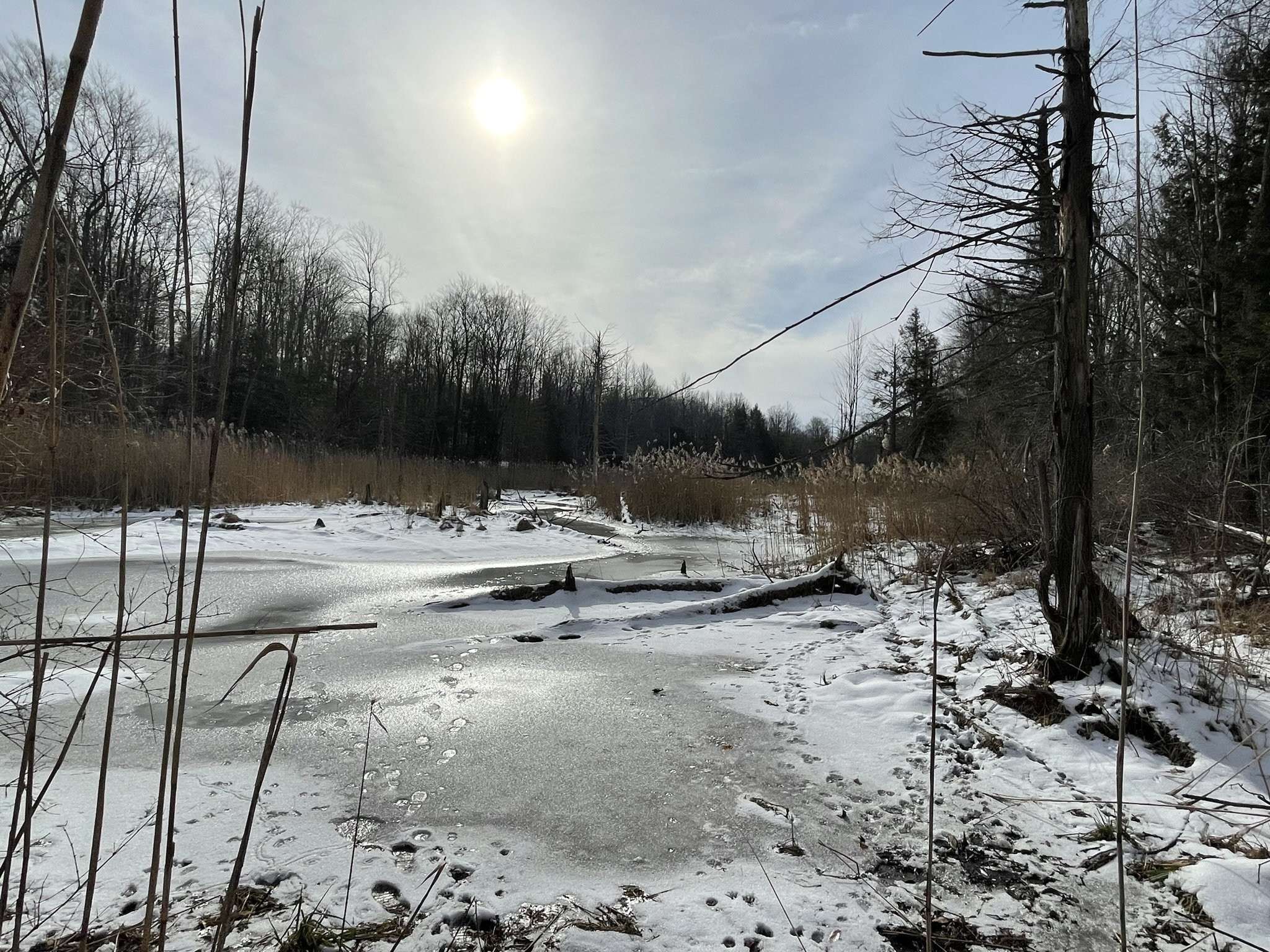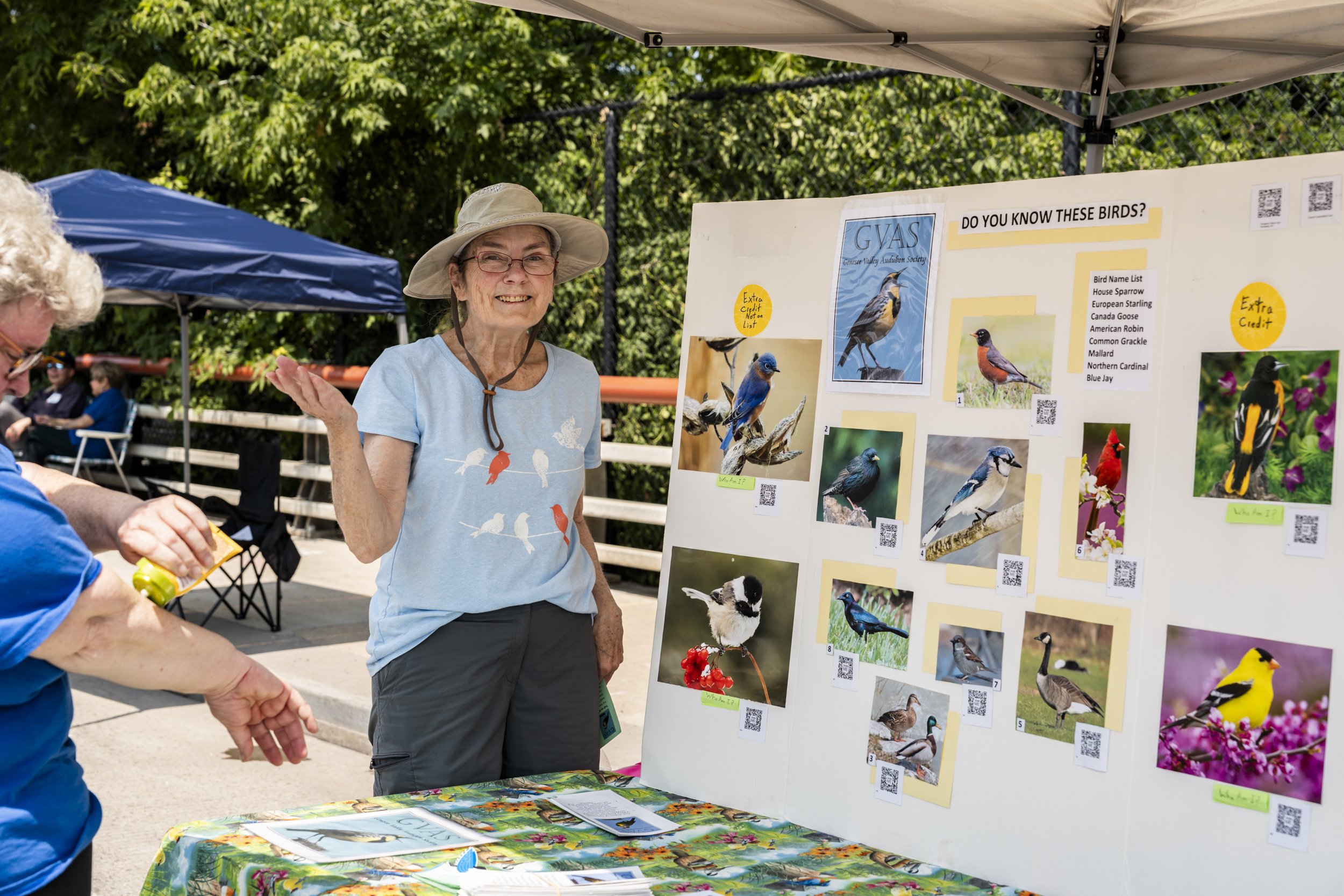Learn fun facts about this important woodland critter that was nearly extinct 100 years ago but is making a comeback thanks to decades of conservation efforts.
Advocacy Resources: February is State Budget Season
Meet Neha Harshita Sood, New President of our Board of Directors
3 Genesee River Winter Walks to Enjoy
A Record Year Protecting Local Working Farms
Eagle Scout Makes Creative Birding Signs At Two Preserves
Community Forum Gathers Input on Variety of Rochester Projects Transforming the Genesee River
Rochester residents and nearby neighbors came out on Sunday, Nov. 17th, 2024 to learn more about the future of the Genesee River, asking questions and sharing their input as part of the planning process for a collection of transformational projects in progress.
Most attendees were excited about improving access and bringing out the beauty of the Genesee River, but concerned about accessibility for people living with disabilities, planners using native species, ongoing funding for trail maintenance, and the potential impacts to their homes and neighborhoods. Residents also shared their ideas for ways to make the river more appealing, from community event spaces and learning opportunities to safety features and street-level shade.
Genesee Land Trust, Genesee River Alliance, and the City of Rochester hosted the gathering. Presentations and information tables covered ROC the Riverway updates, the Genesee Riverway Trail Extension to Lake Ontario, the Inner Loop North transformation project, and High Falls State Park.
“With the support of Governor Hochul, local leaders at the Genesee Land Trust and the Genesee River Alliance, and our residents, we’re making huge strides toward revitalizing our waterfront and creating a unique destination that strengthens our region and fuels economic growth,” said Mayor Malik D. Evans. “This forum and other opportunities for public feedback will help ensure that final plans take into account the intimate knowledge of those who enjoy the river or live near its banks.”
Residents also learned about organizations and resources serving riverside communities, and ways to enjoy the river year-round. They got to meet with City planners, project leaders and community organizations engaged in the various projects. Special thanks to New York State Parks, OLIN (the design firm leading the state park), Seneca Park Zoo, Climate Solutions Accelerator, Tour Blend, and Rec on the Move.
Genesee Land Trust has advocated for the Genesee River for more than 20 years and formed the Genesee River Alliance in 2019 to build city, county, and state support for our vital waterway running through the heart of Rochester. The forum was part of an ongoing effort to engage and support more riverside residents, especially marginalized and under-represented people in the Edgerton and El Camino neighborhoods.
“Right now we’re at a pivotal moment for our mighty Genesee, the heart of Rochester and a critically important resource for our entire community,” says Helen Dumas, Director of Urban Engagement for Genesee Land Trust. “From big decisions to small details – these projects will transform our river and region. We need more diverse voices throughout the decision-making process to prioritize the needs and concerns of our entire community.”
In July of this year, the Land Trust hosted its first riverside celebration - Bridging Communities. More than 600 people came together to enjoy beautiful waterfall views and have fun in nature. Bridging Communities will return to Driving Park Bridge and the Maplewood Park Rose Garden on July 26, 2025. If you are interested in participating in Bridging Communities 2025, please fill out this form.
Information about current river-related projects, community resources, and more feedback opportunities are available below.
The City of Rochester invites anyone interested in signing up for updates or leaving comments about the ongoing Genesee Riverway Trail study to visit:
For anyone interested in contacting the Inner Loop North Project Team with any questions, ideas, and comments about the Inner Loop North Project, fill out this form:
Check out the media coverage of the forum:
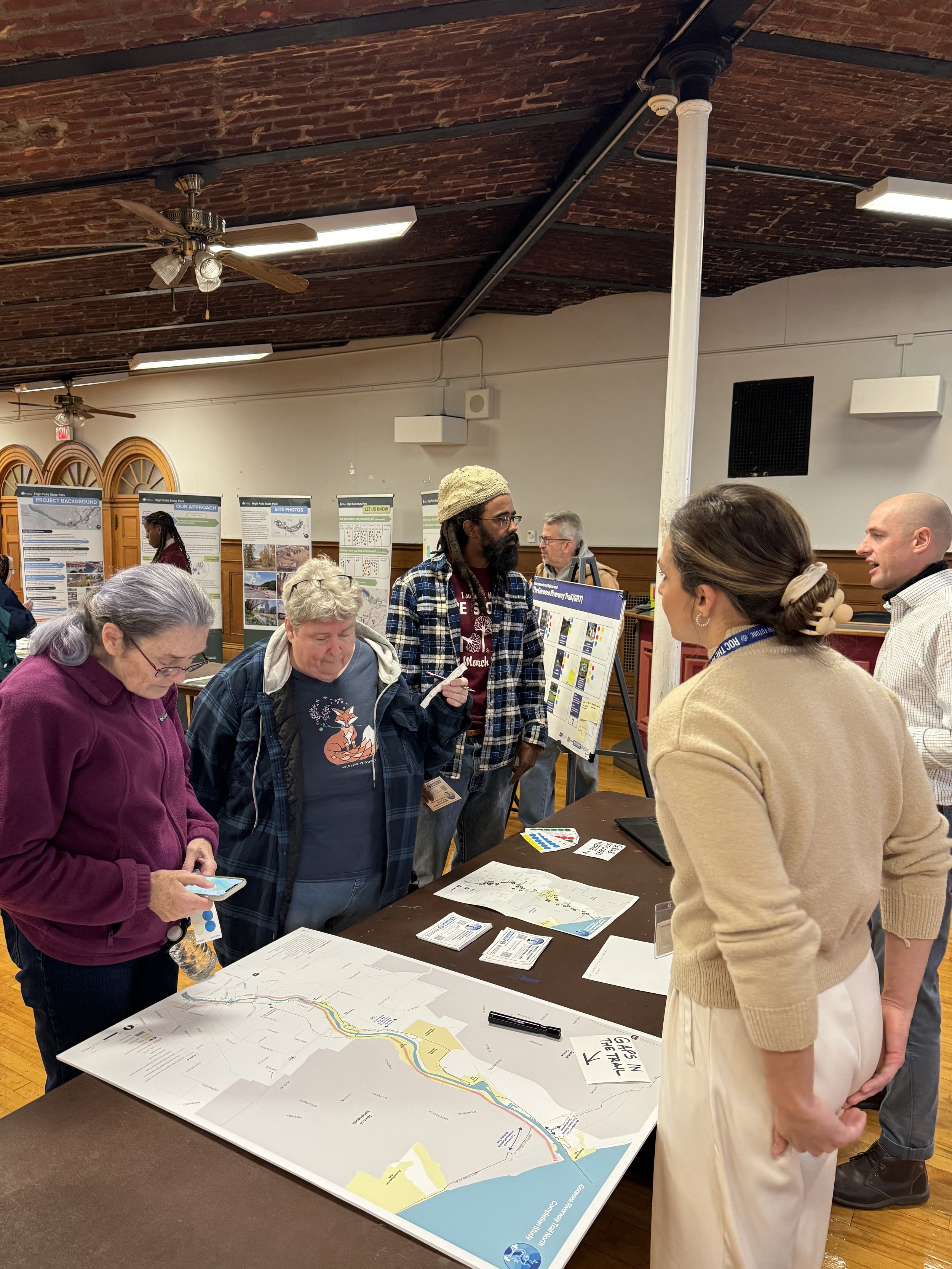
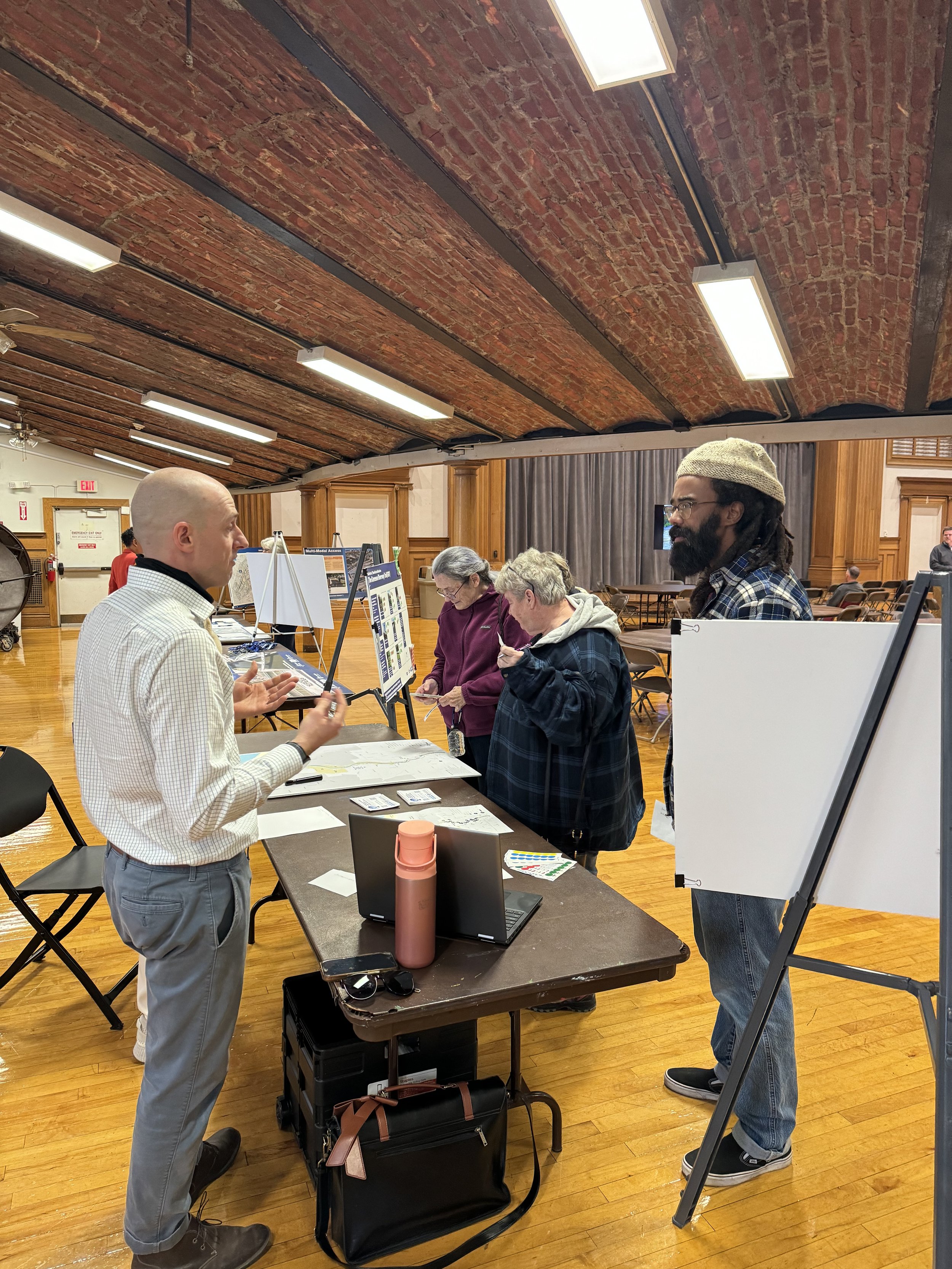
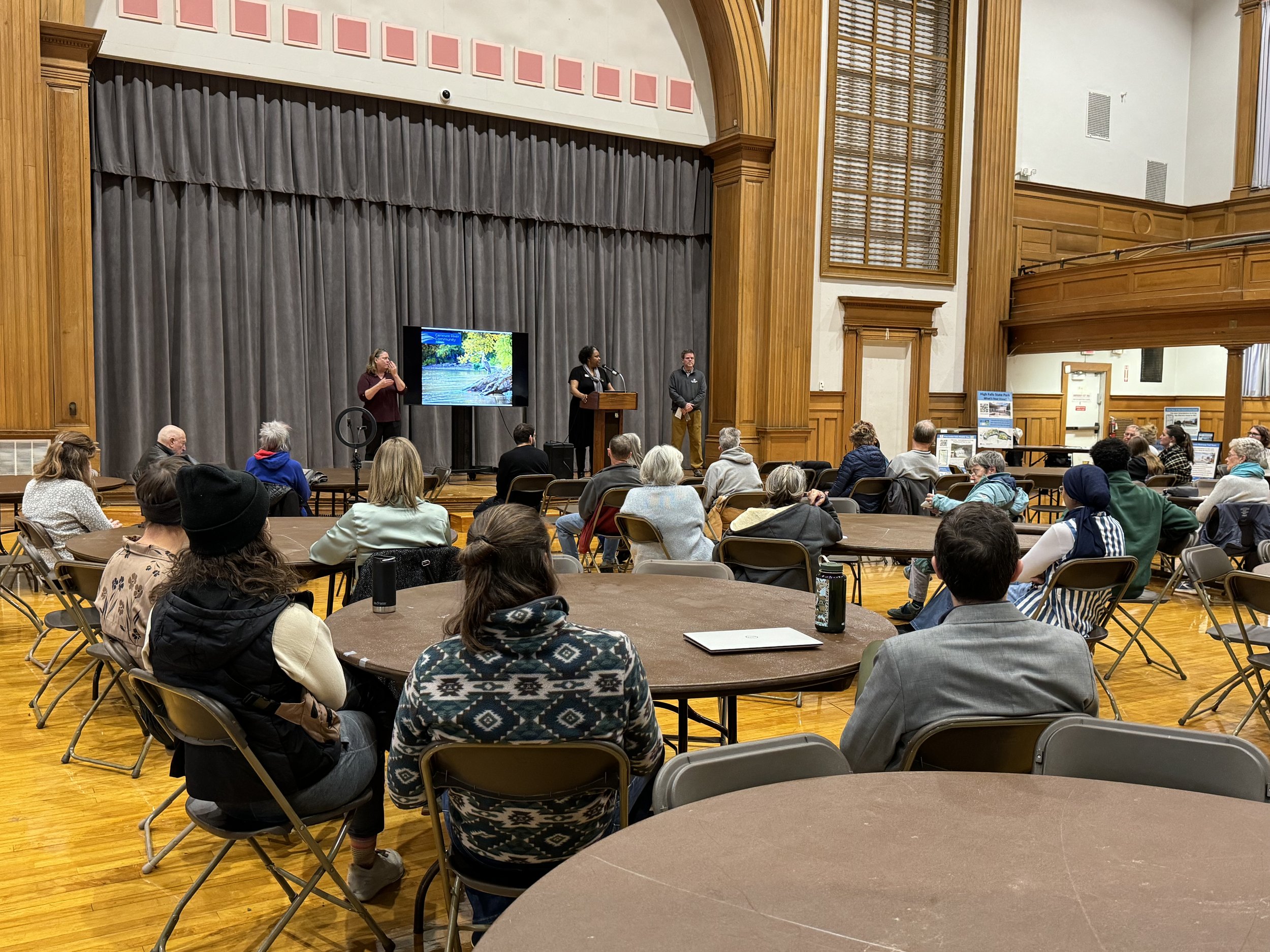
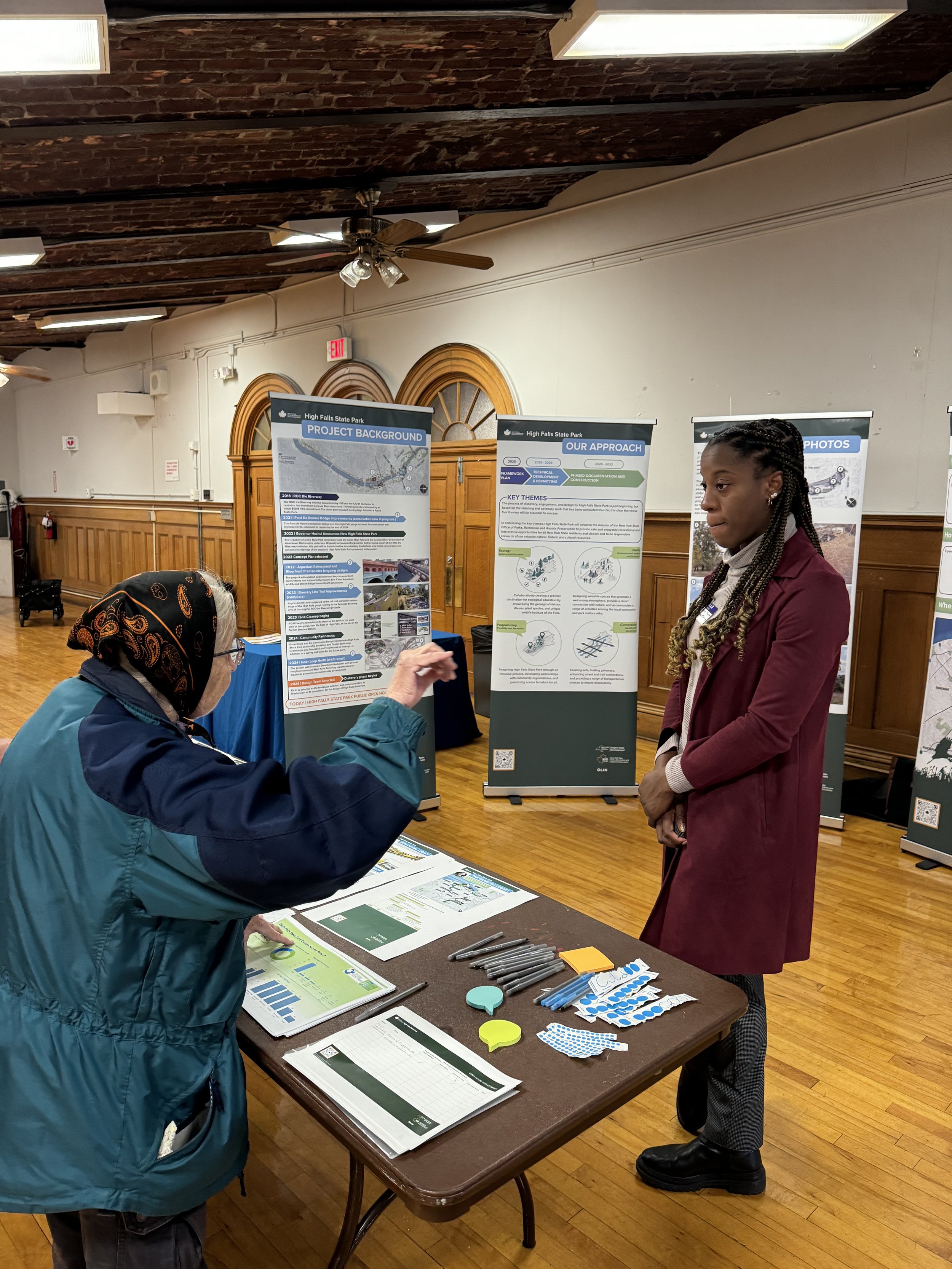
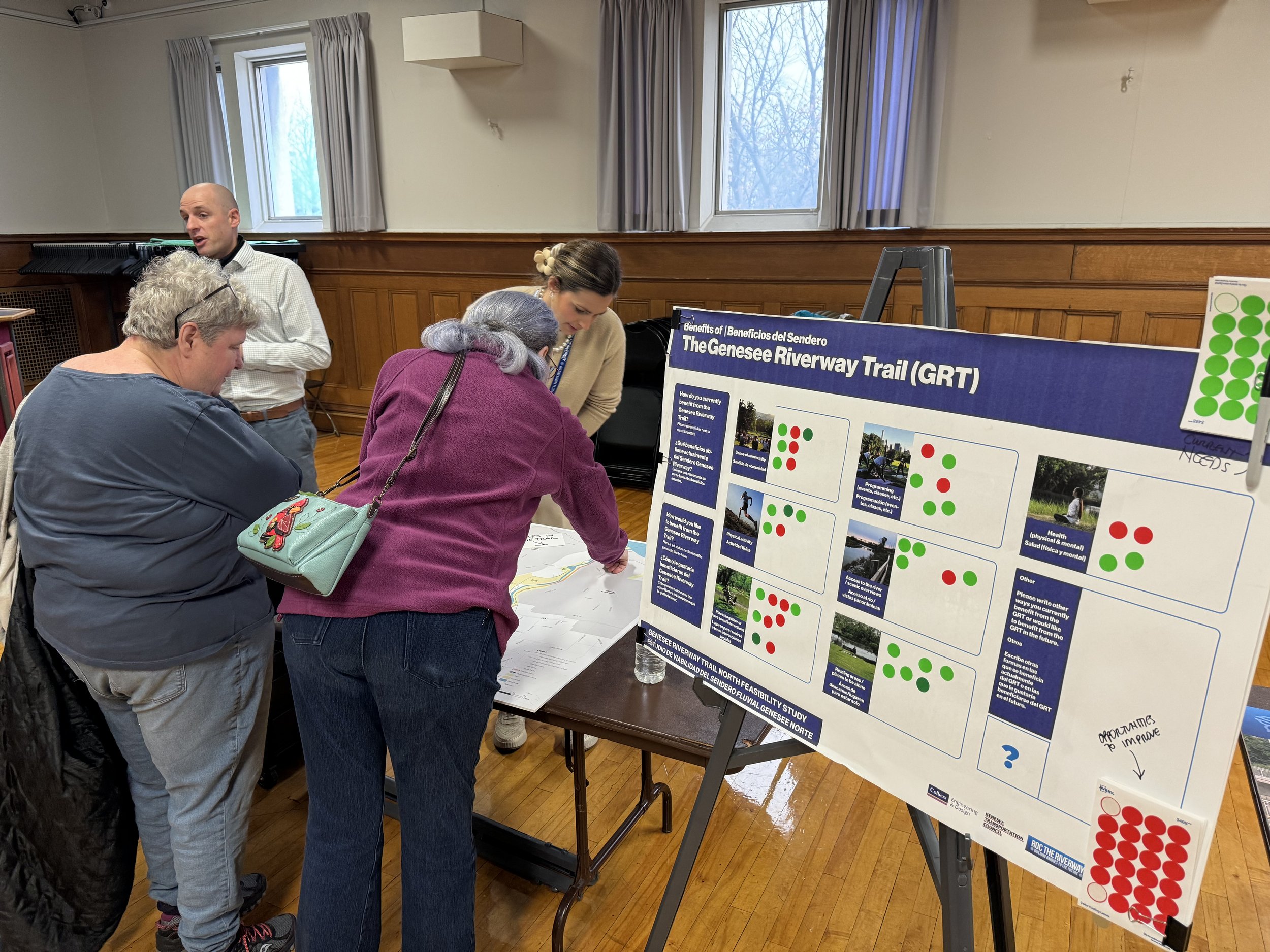
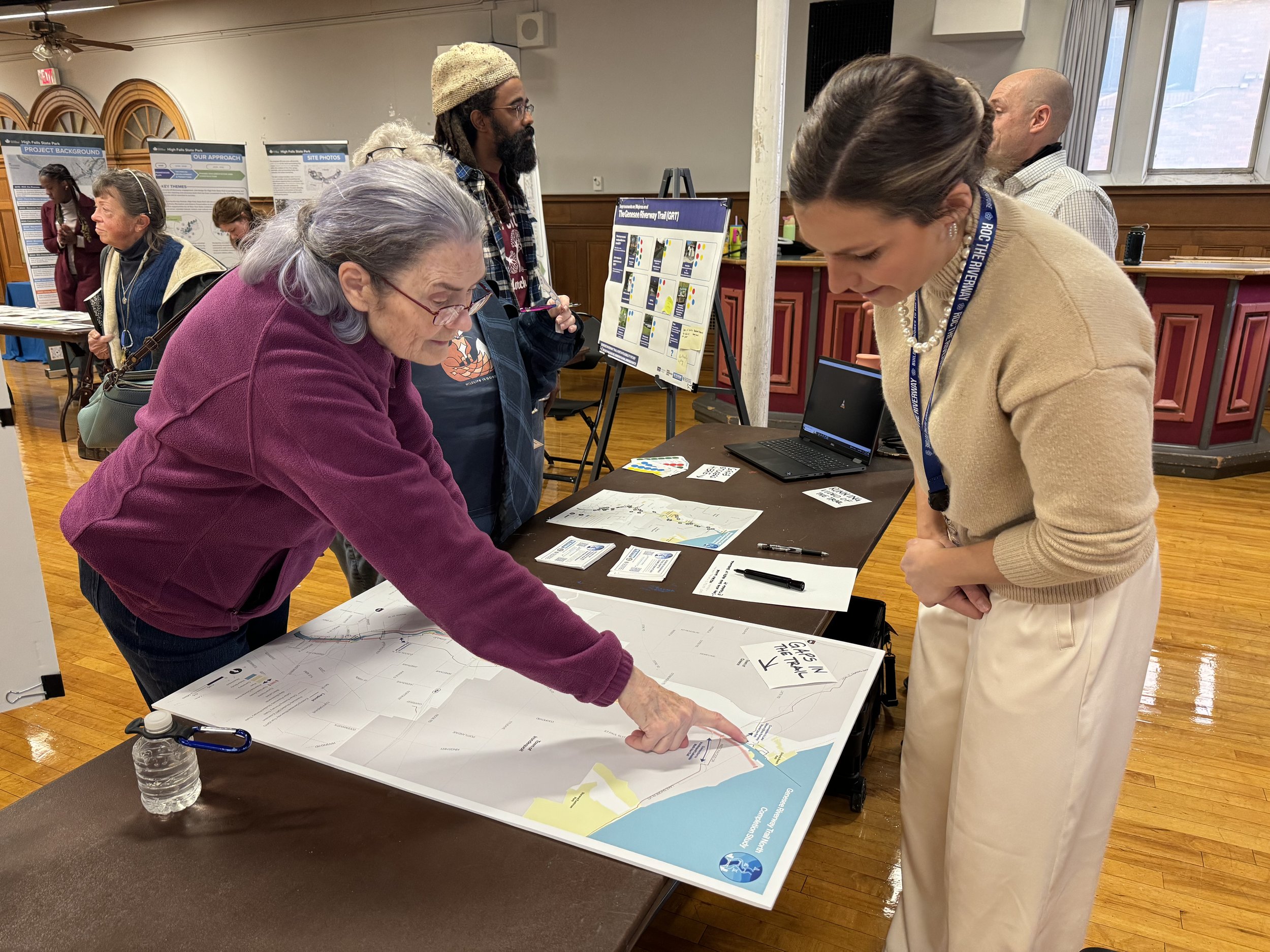
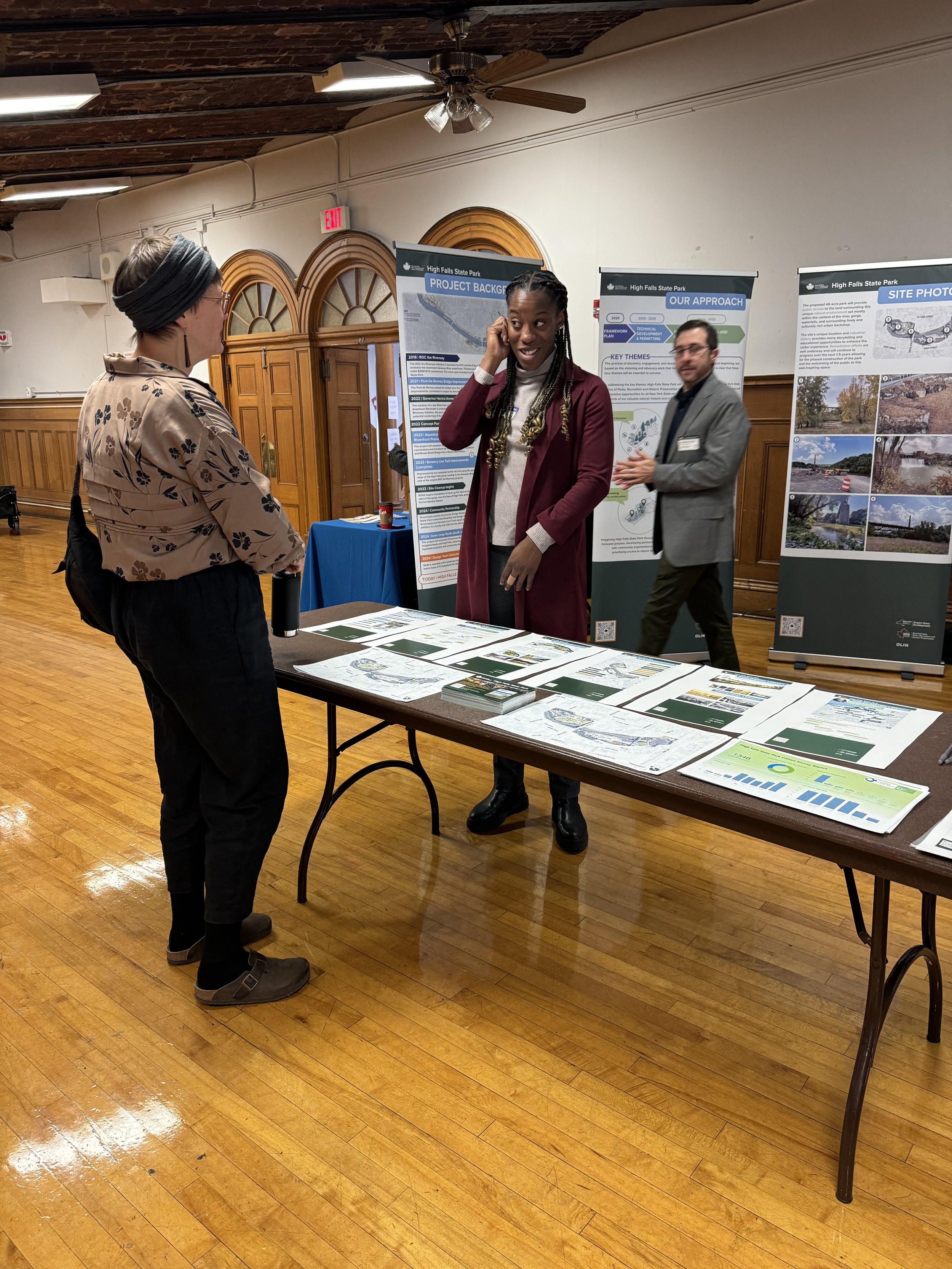
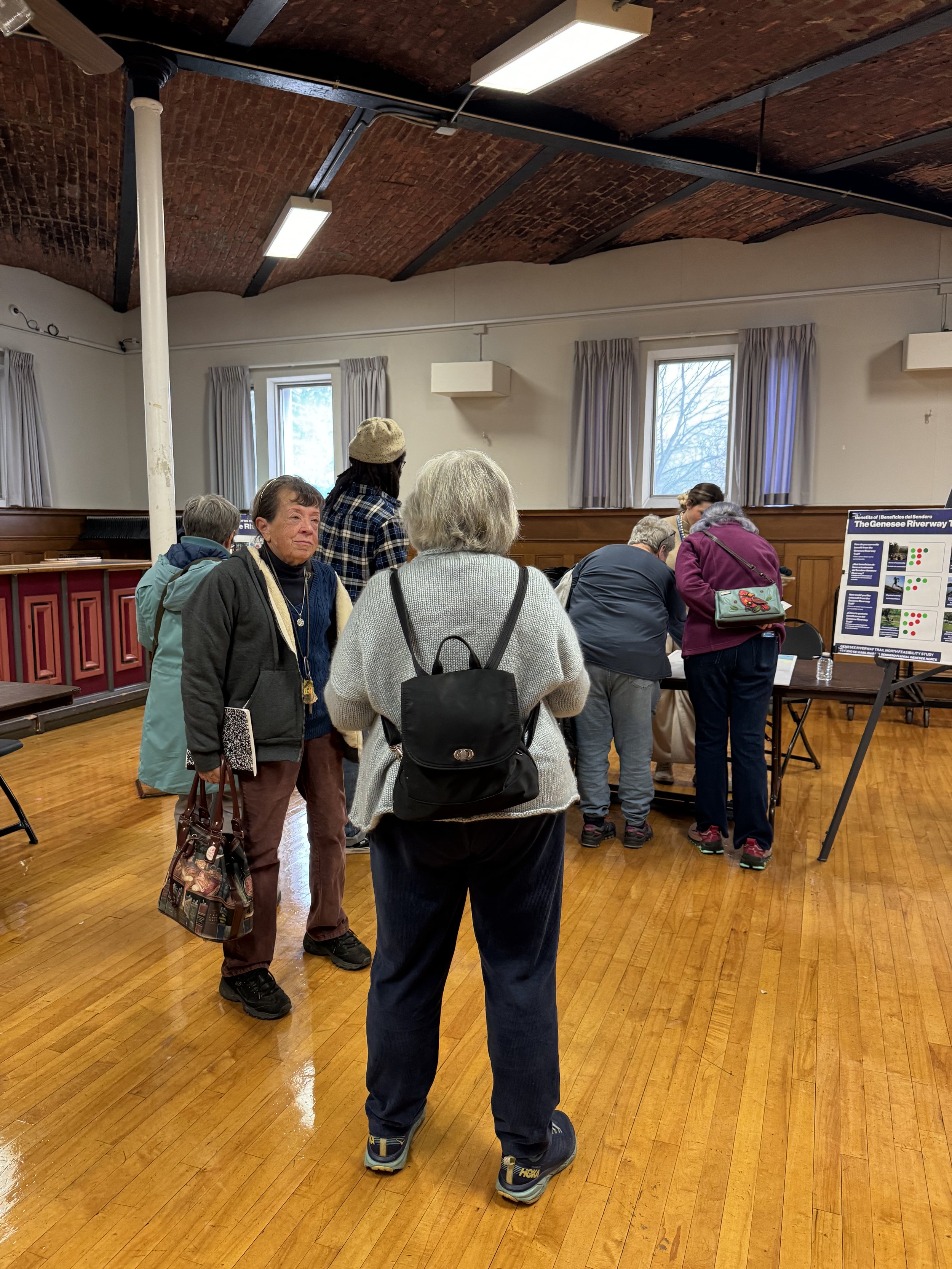
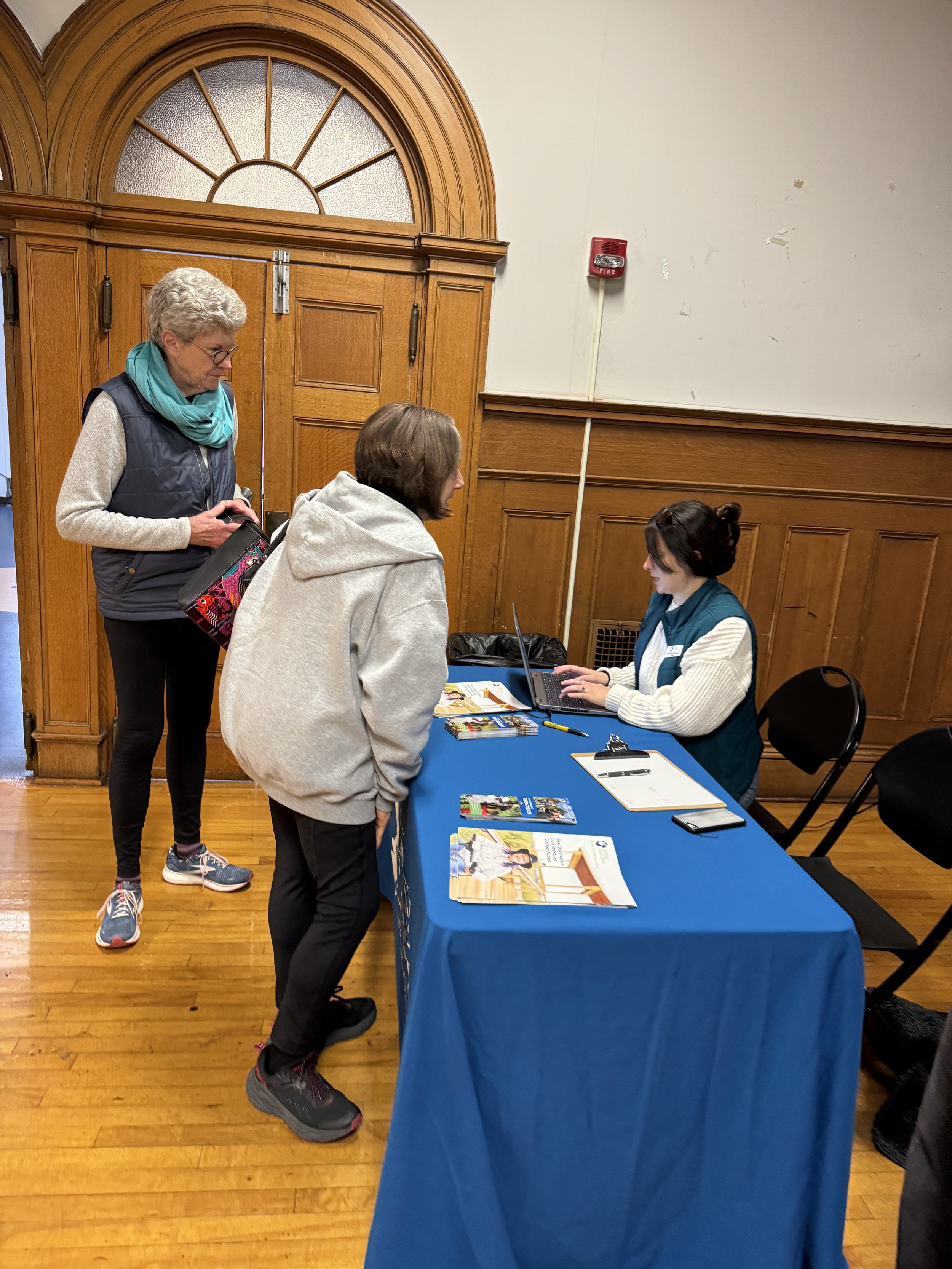
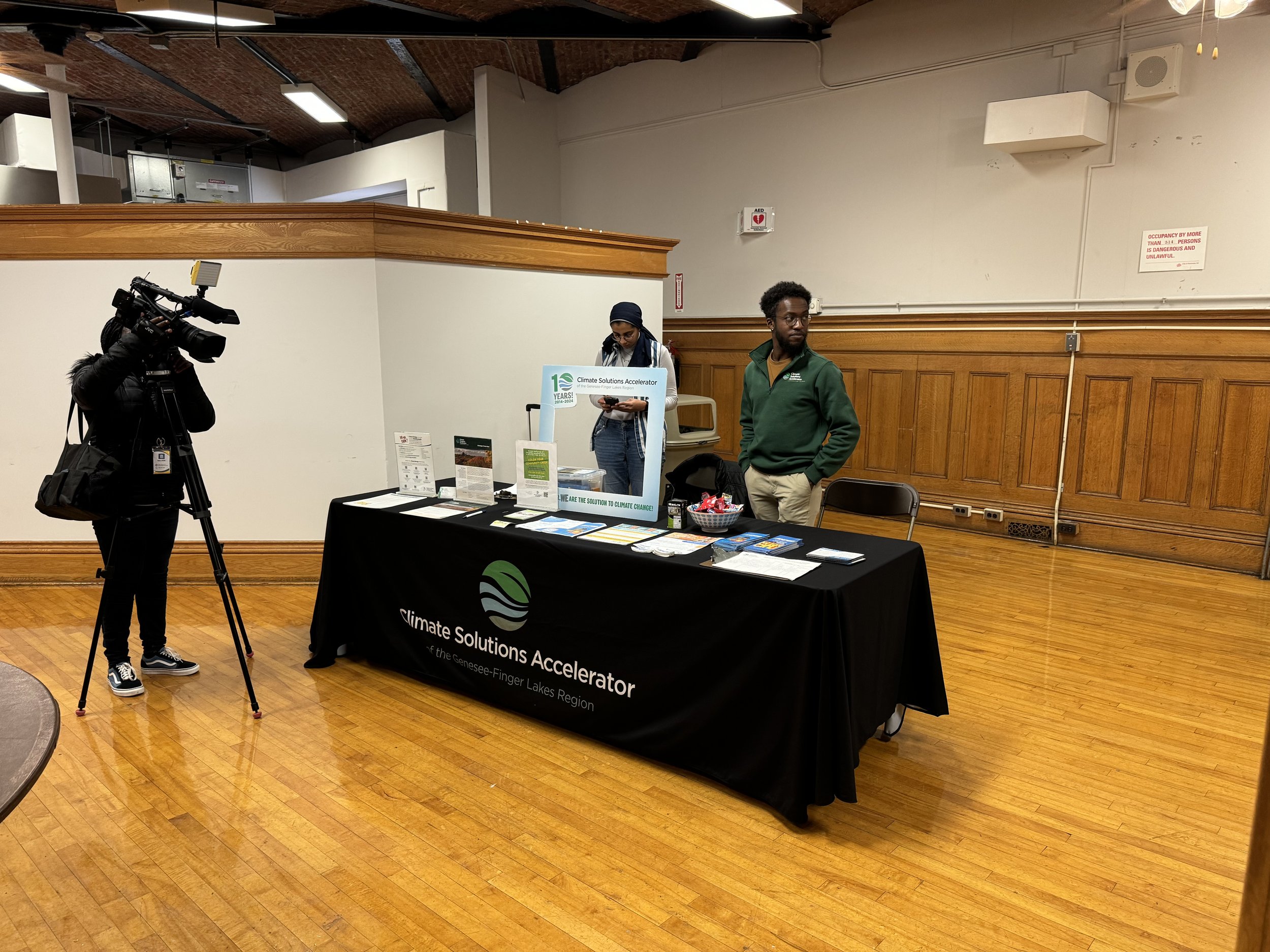
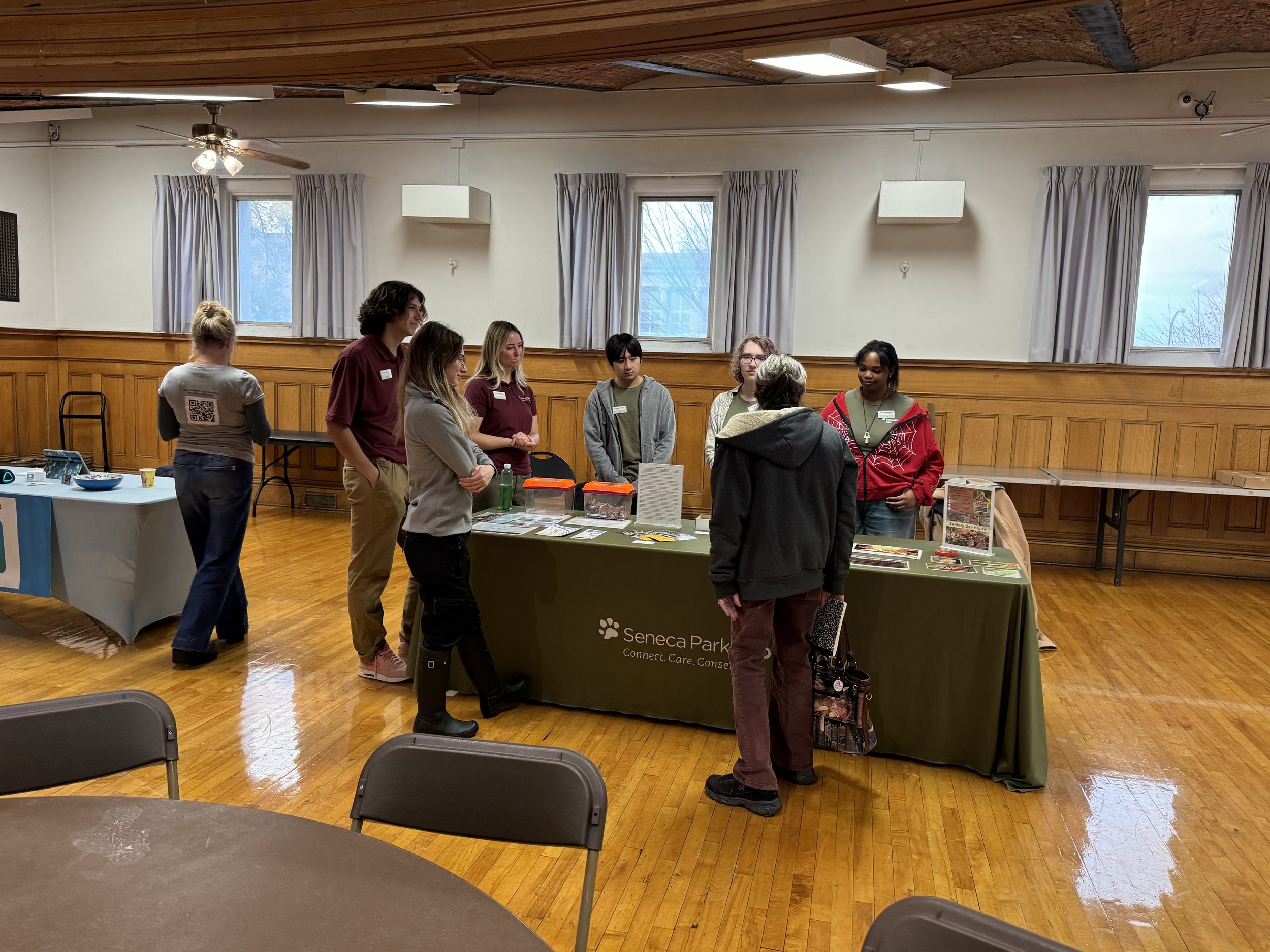
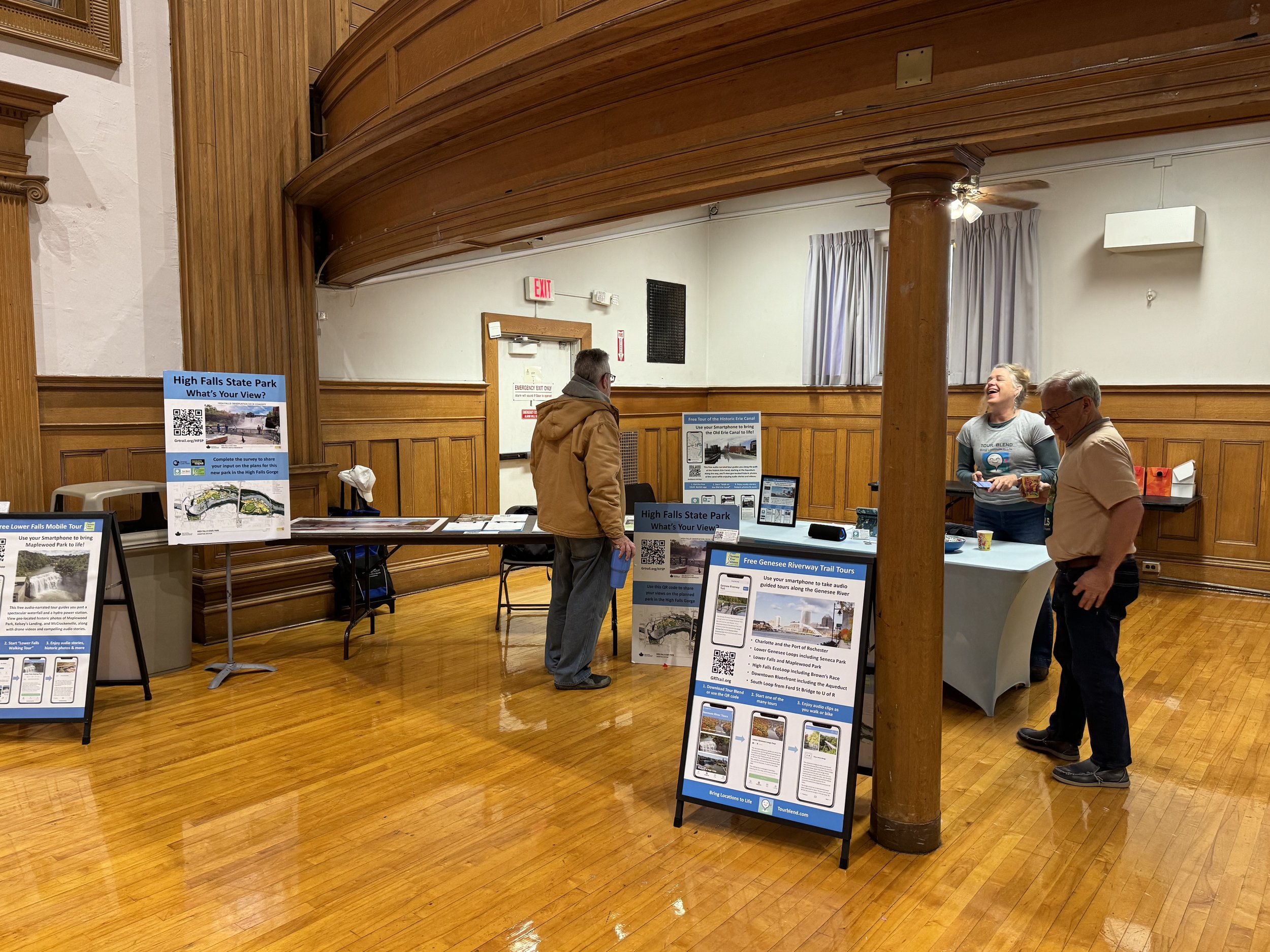
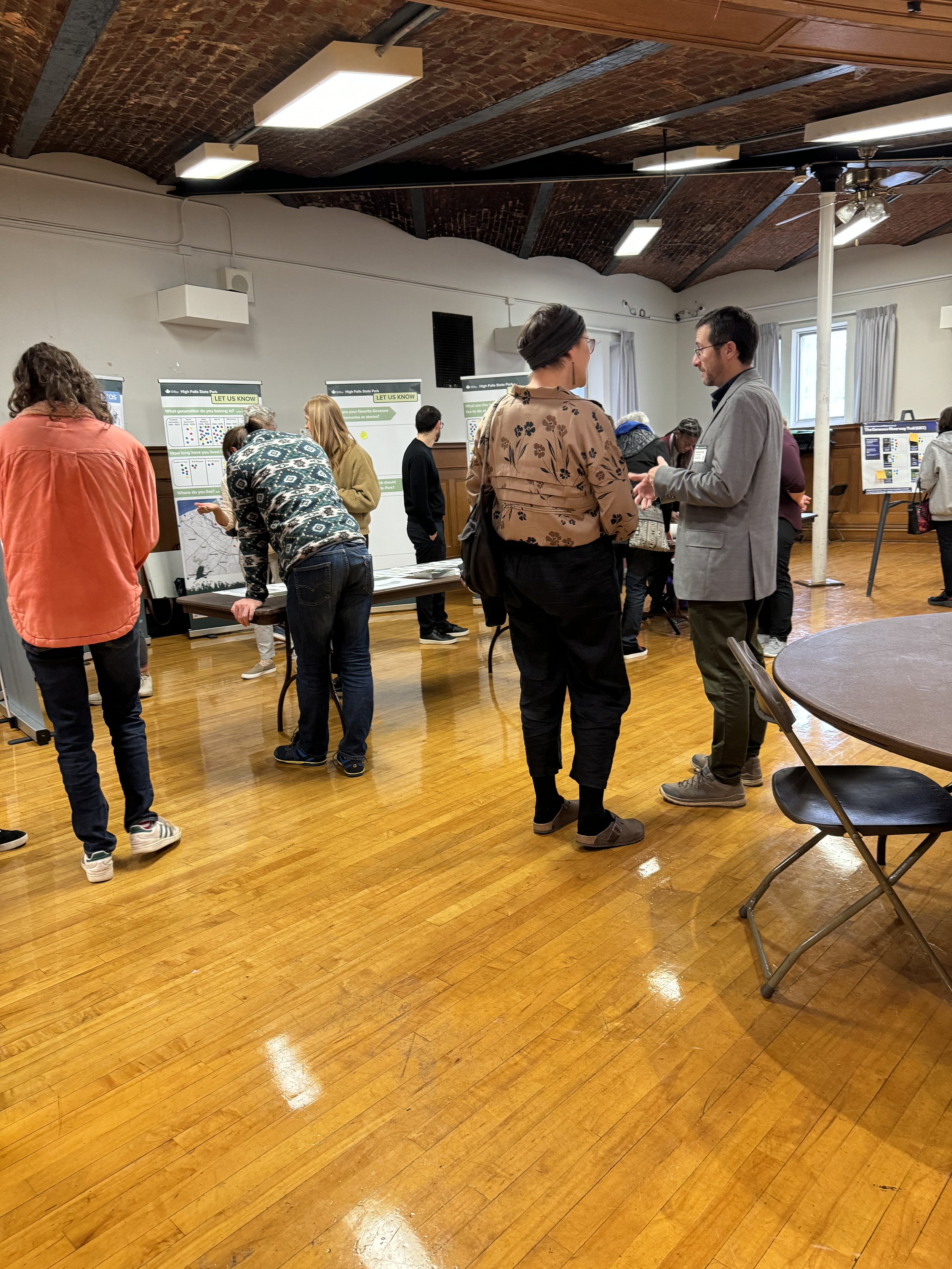
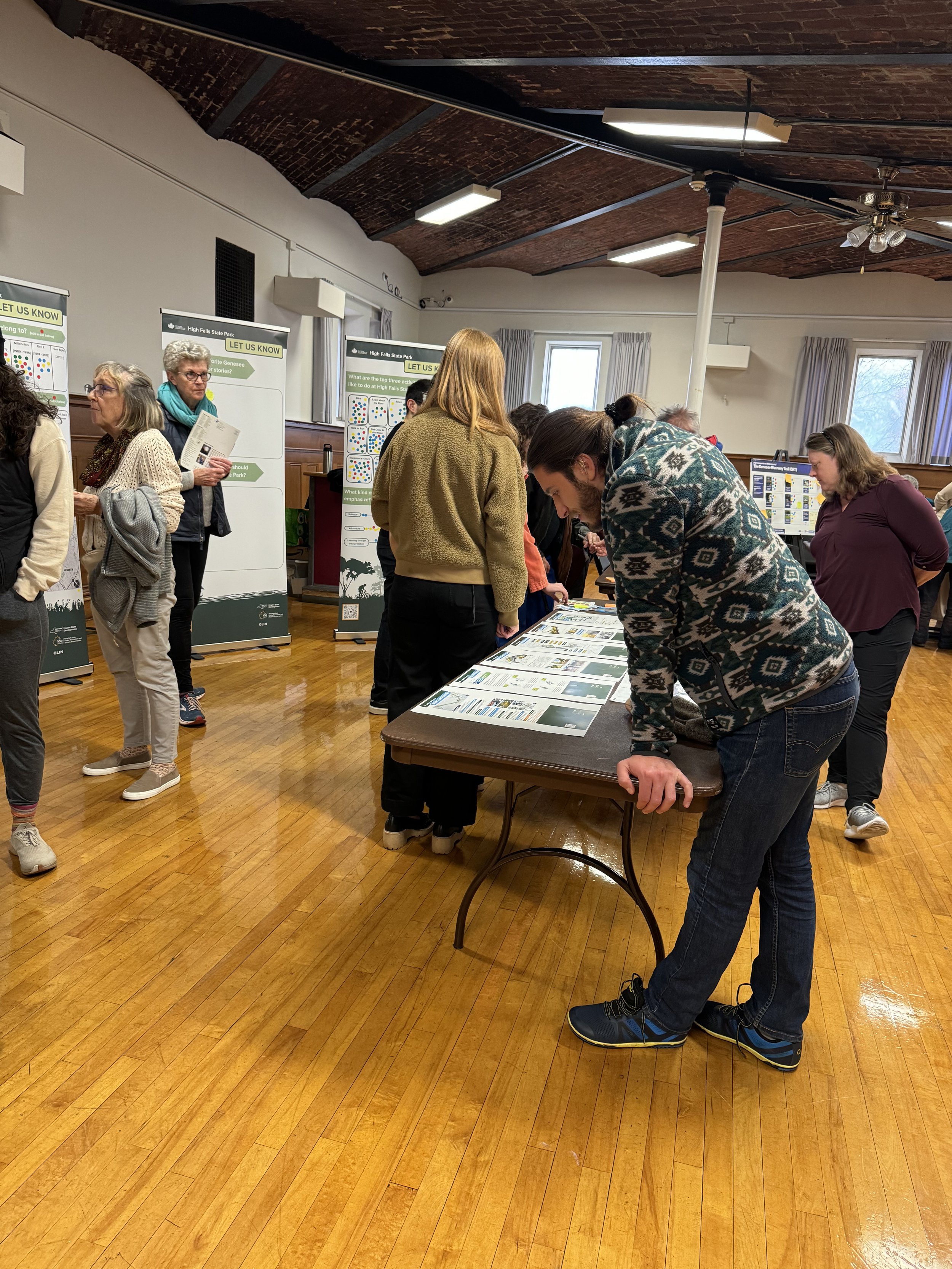
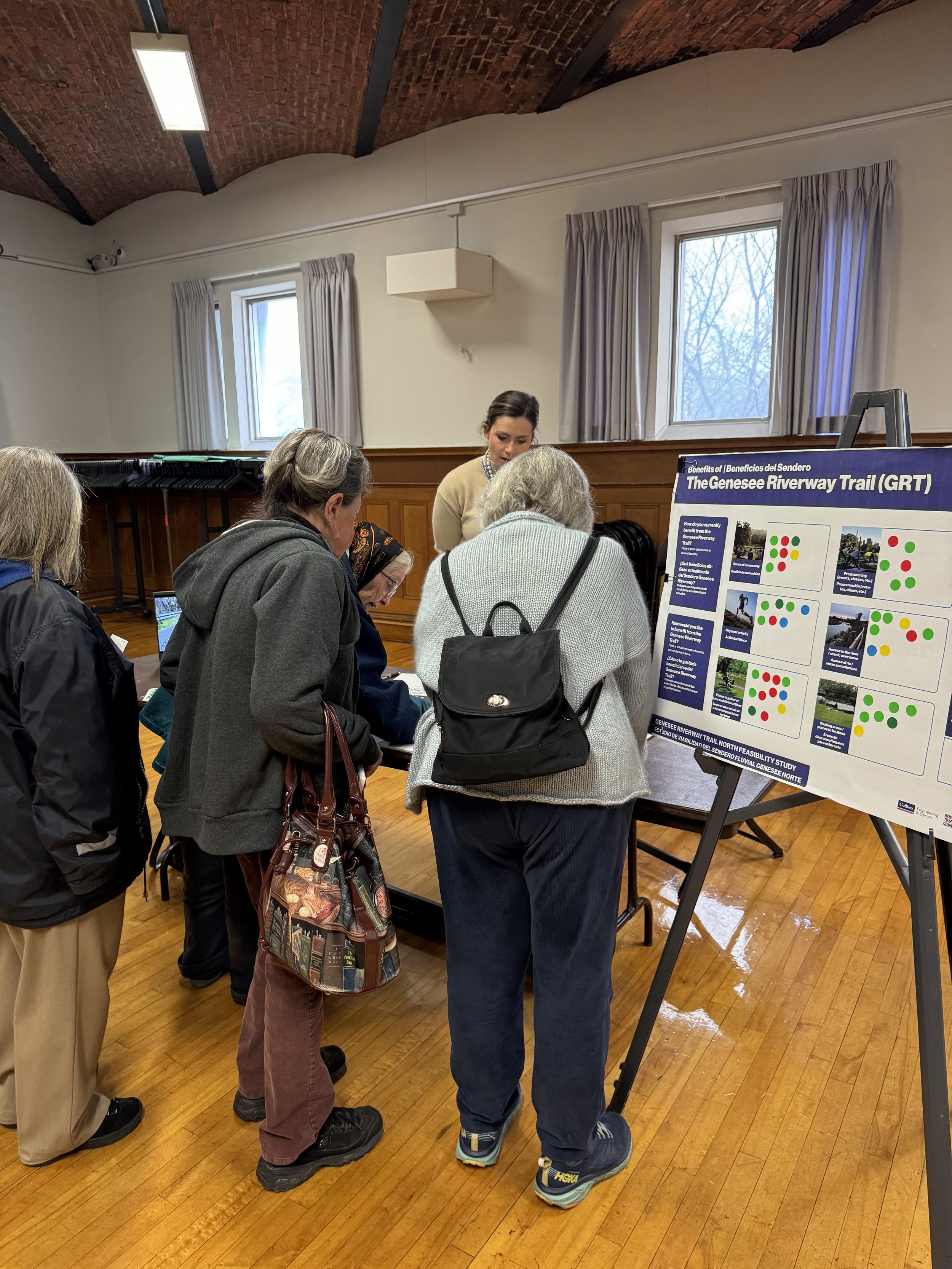
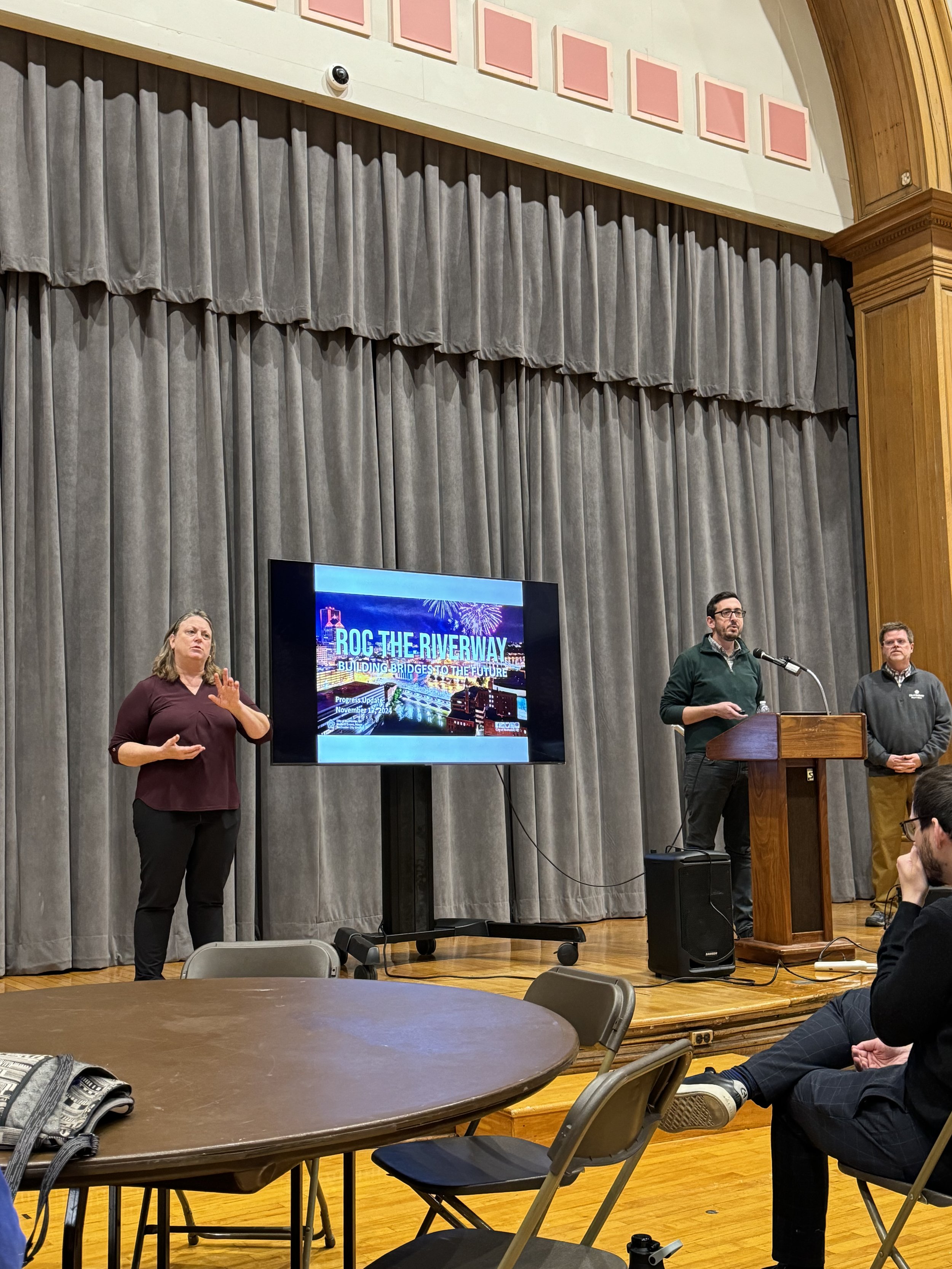
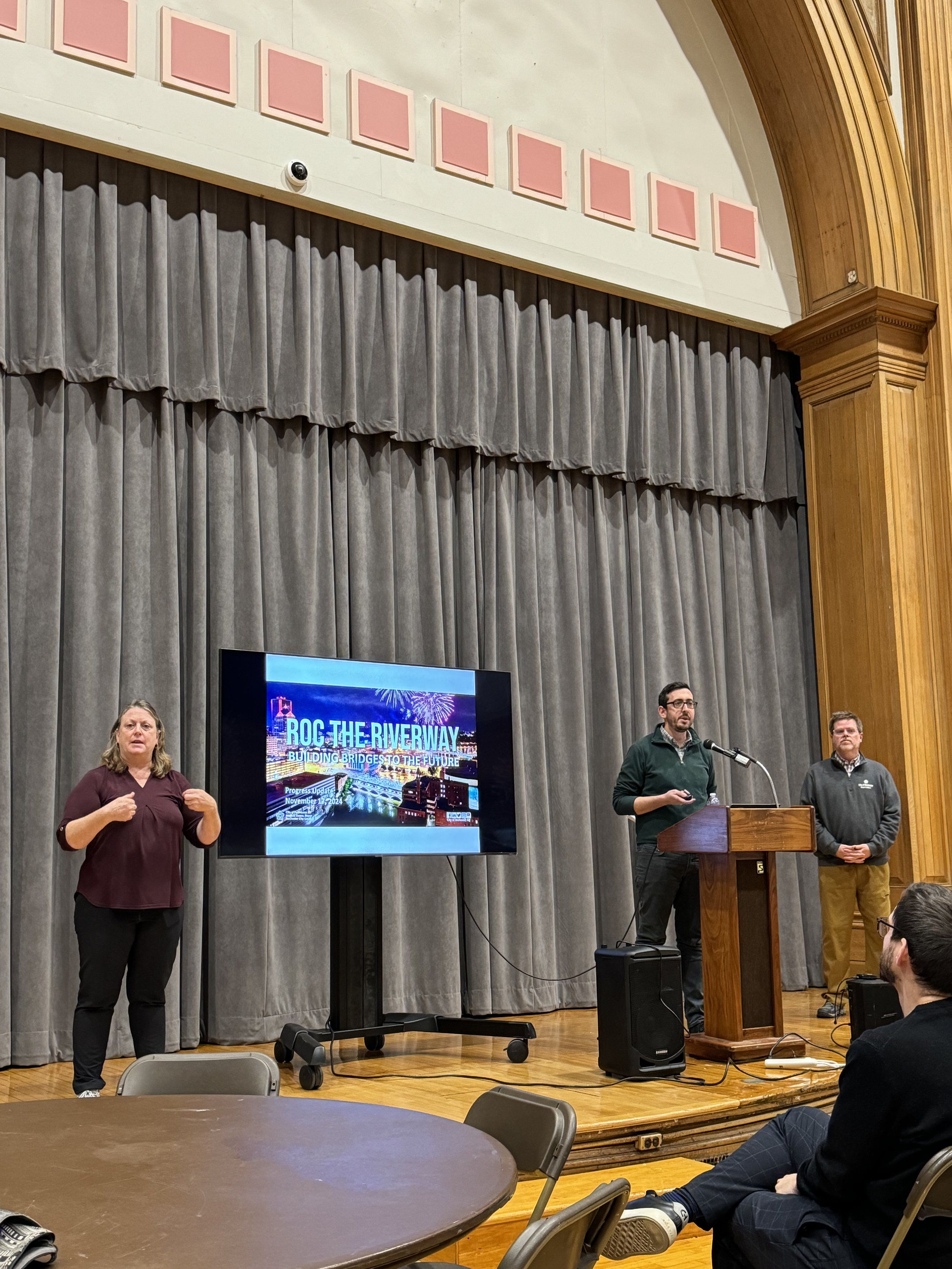

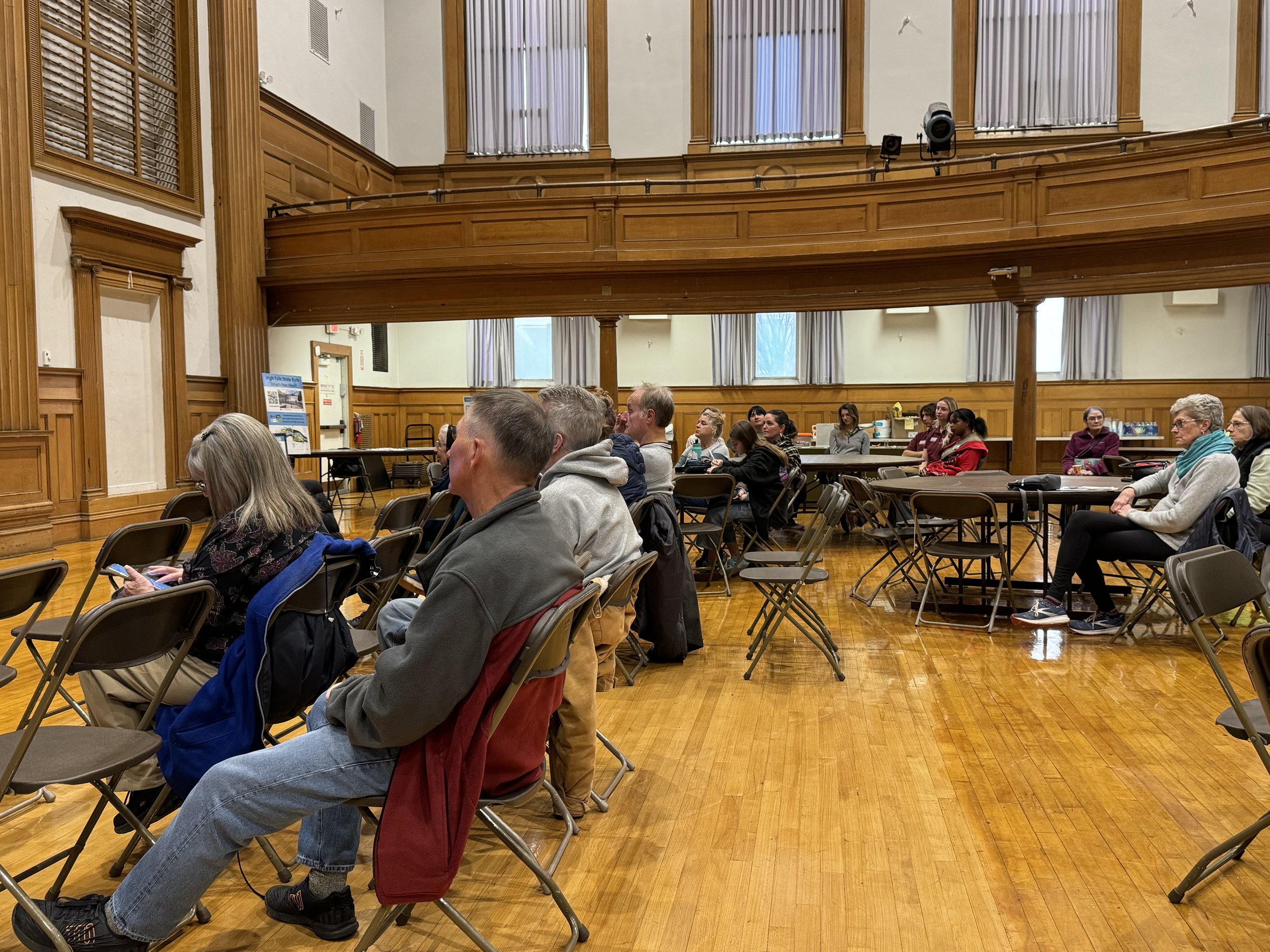
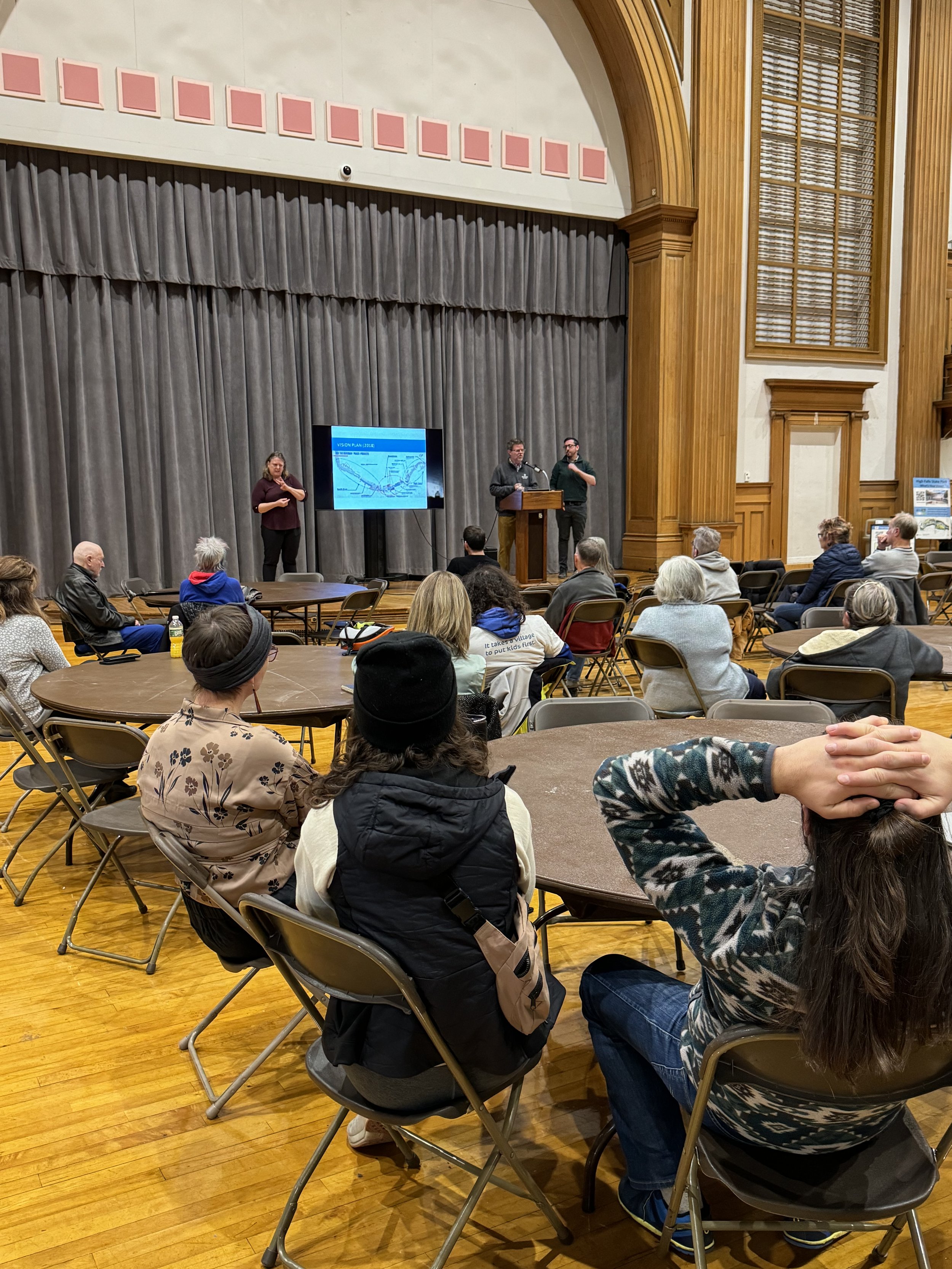
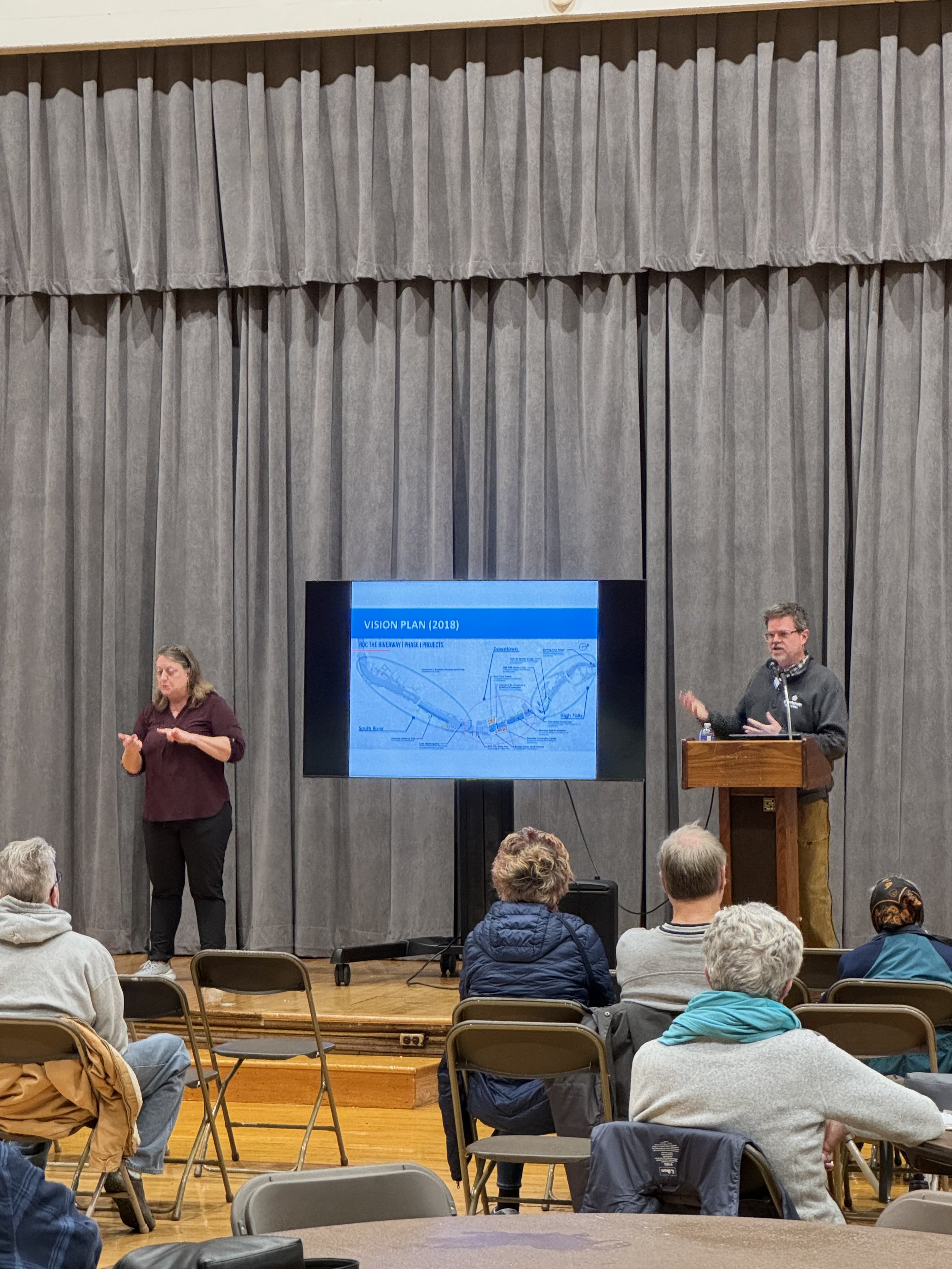
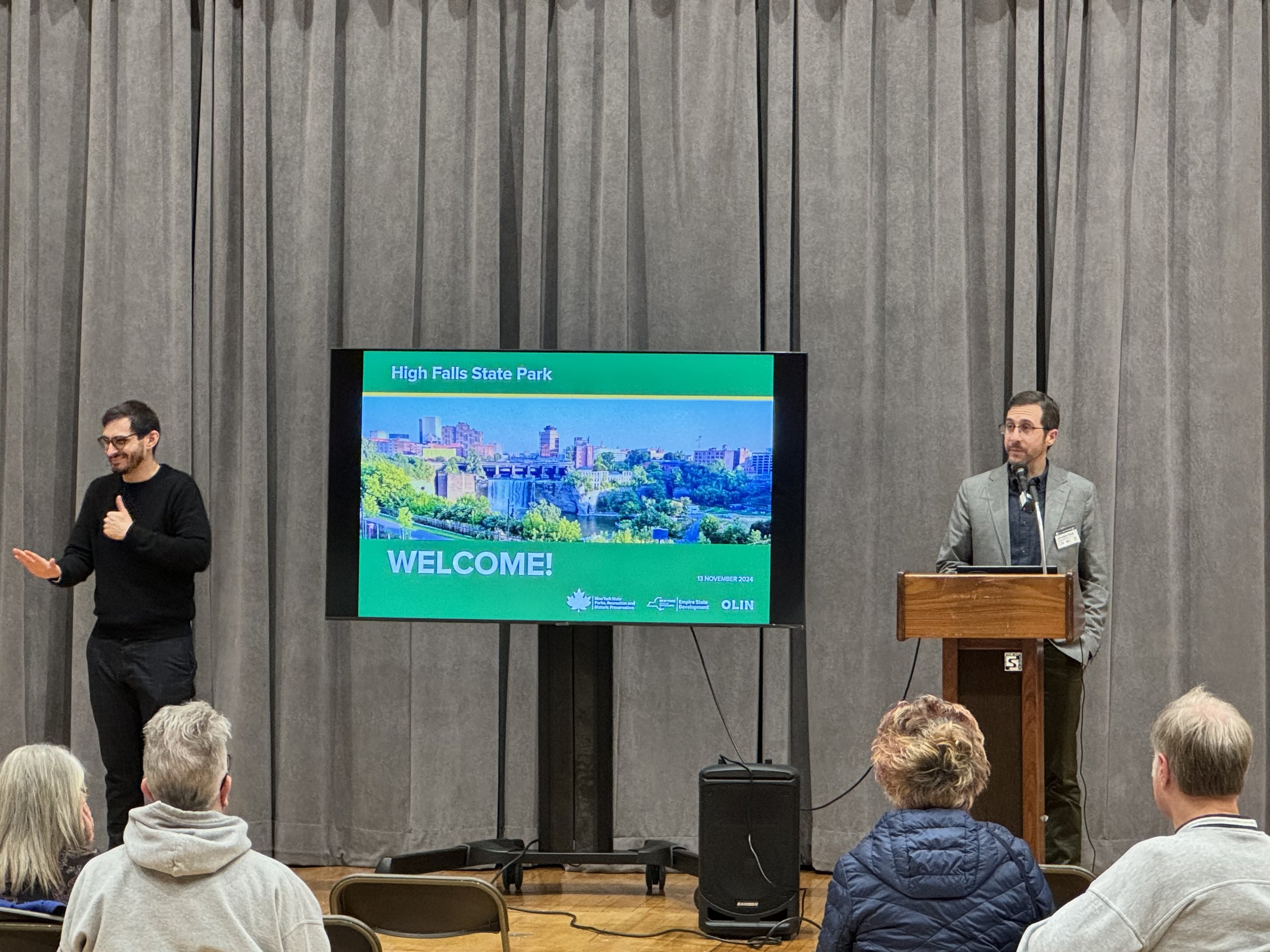

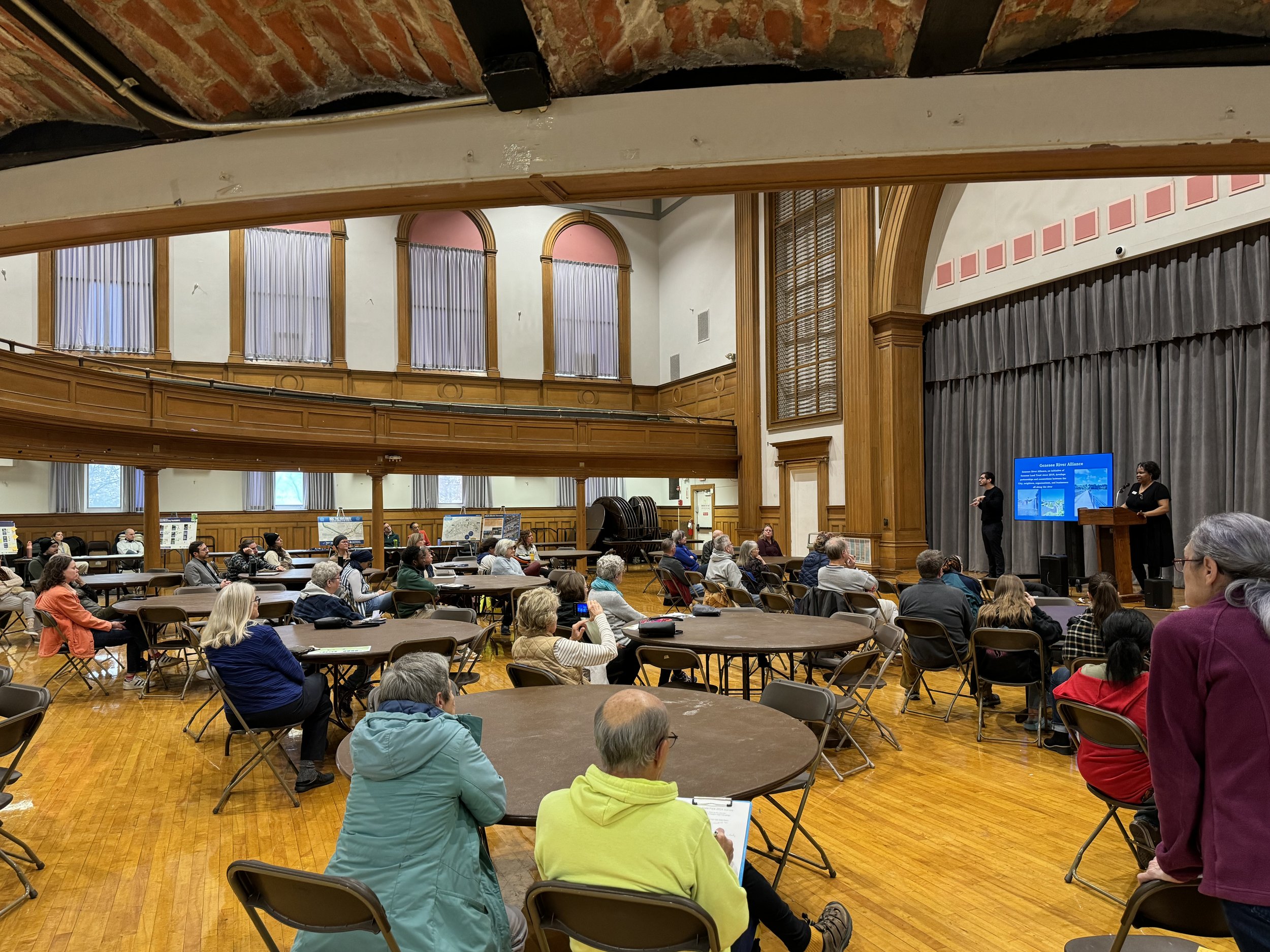
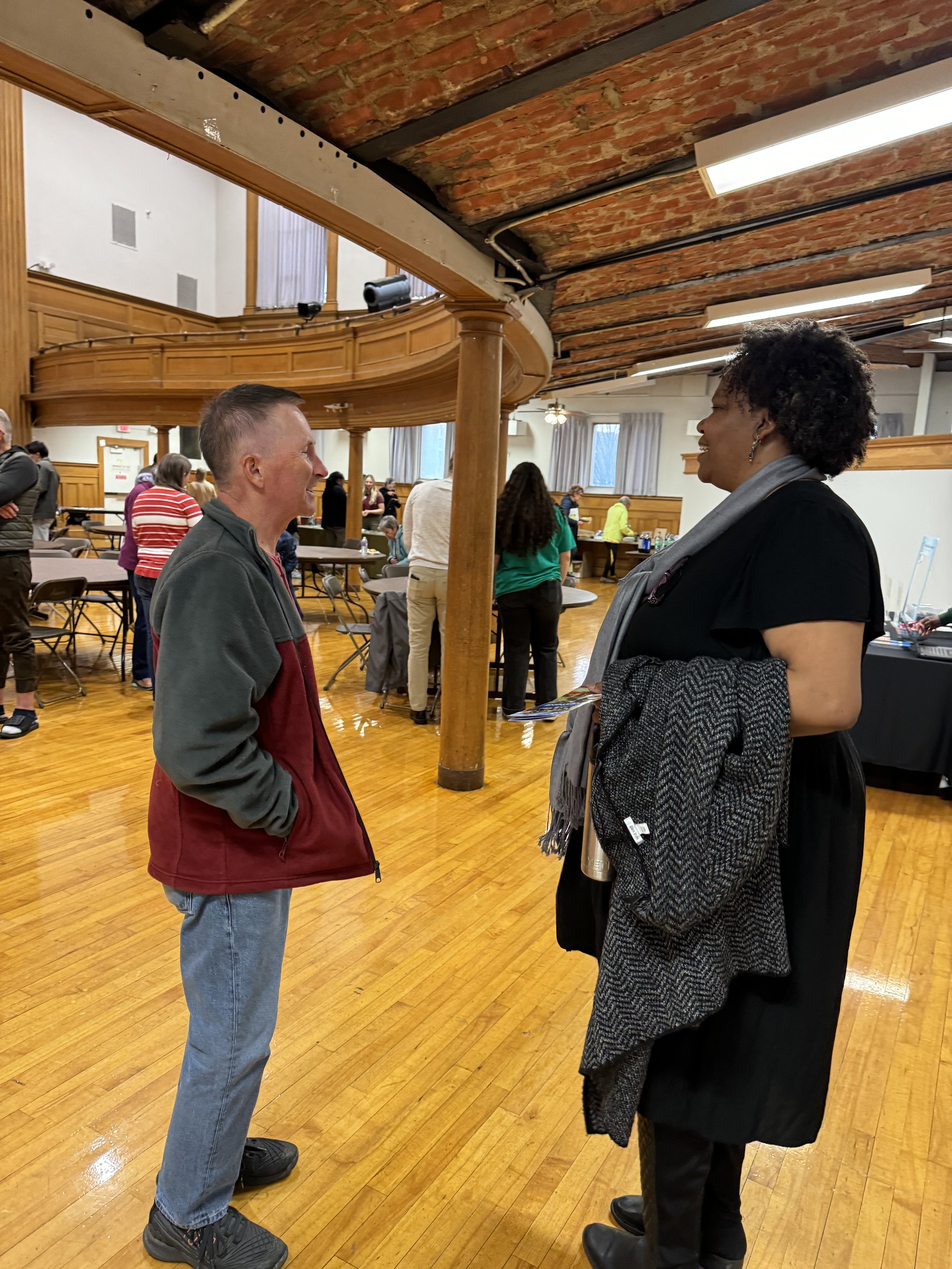
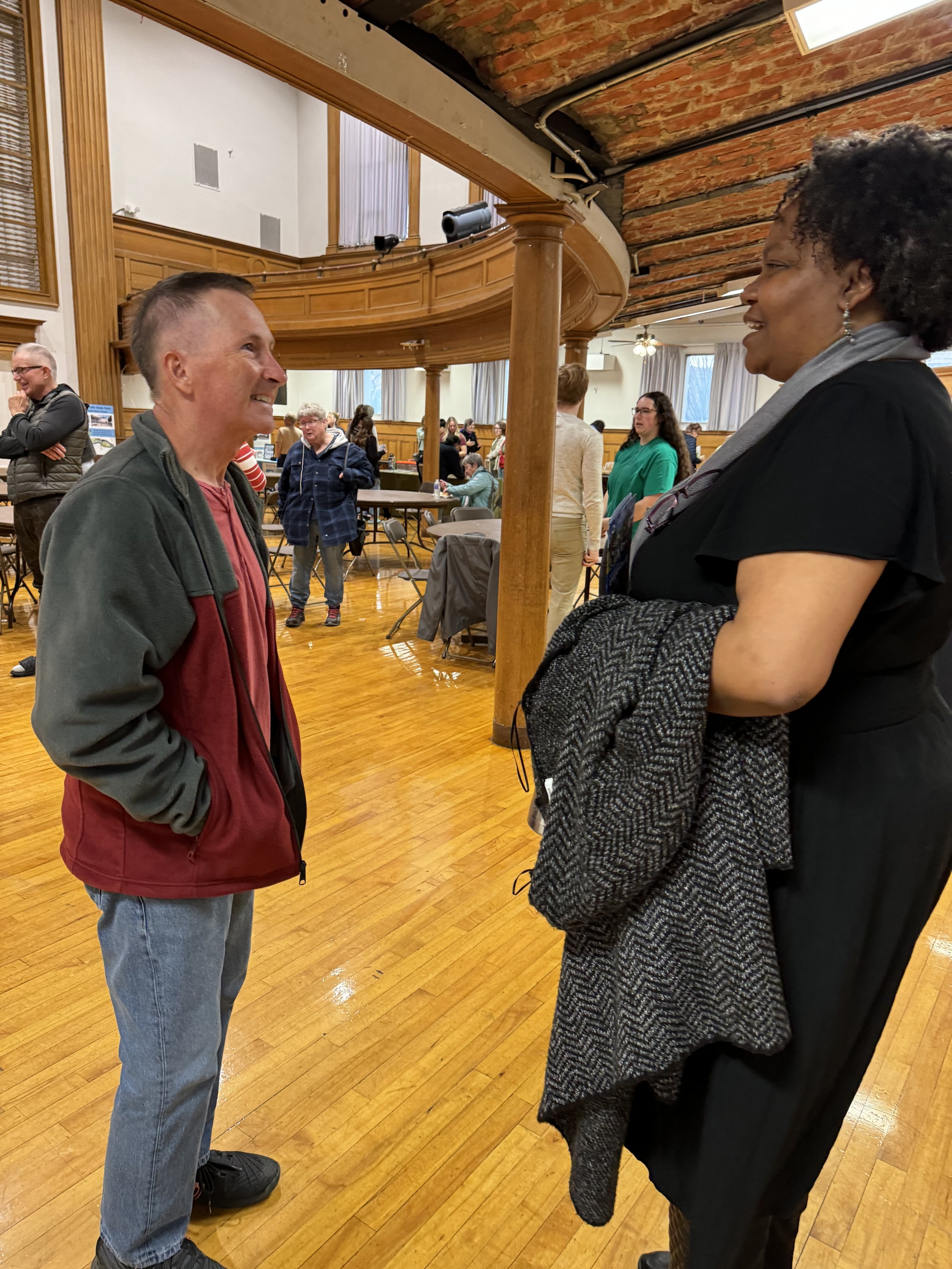

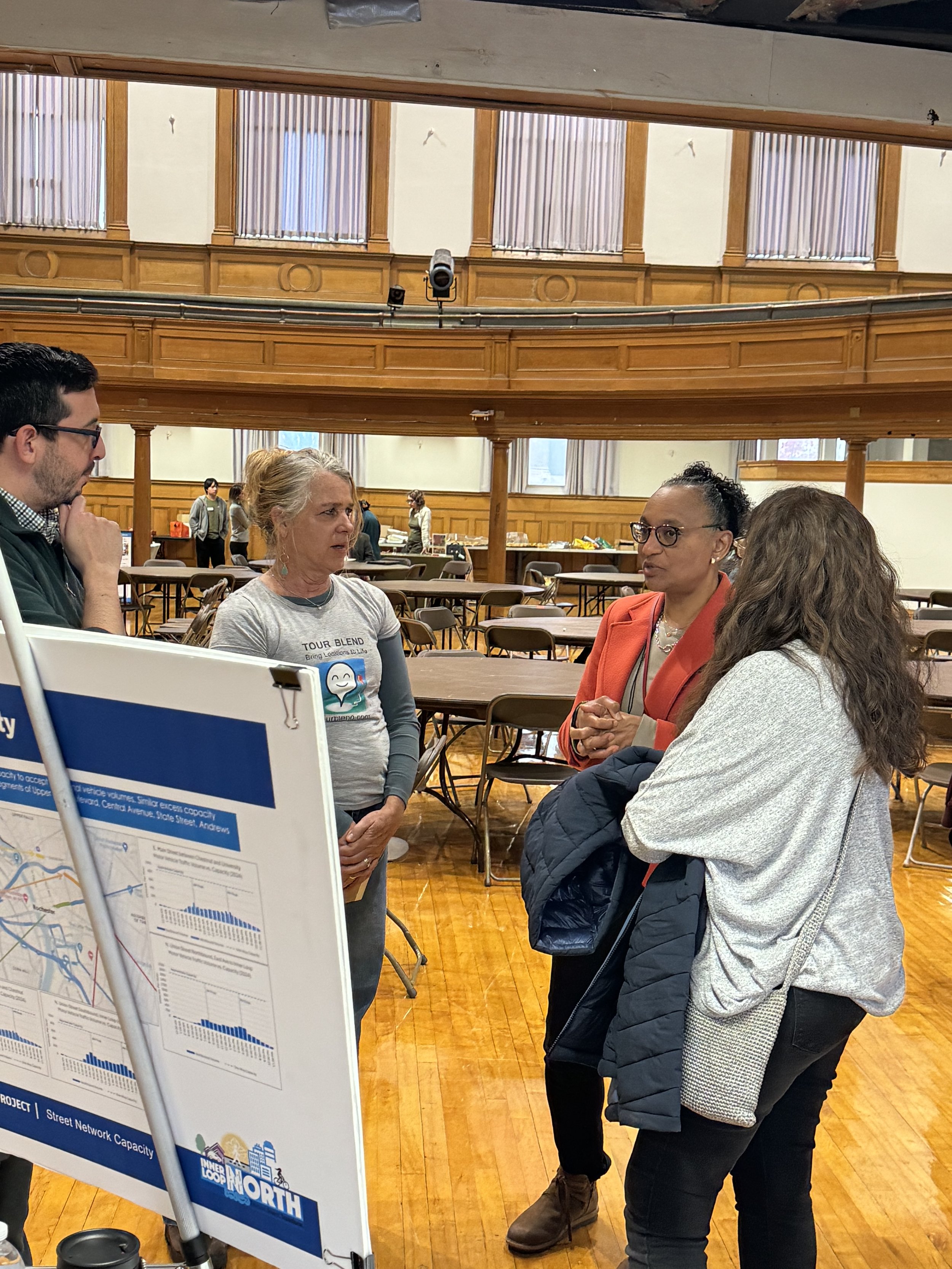
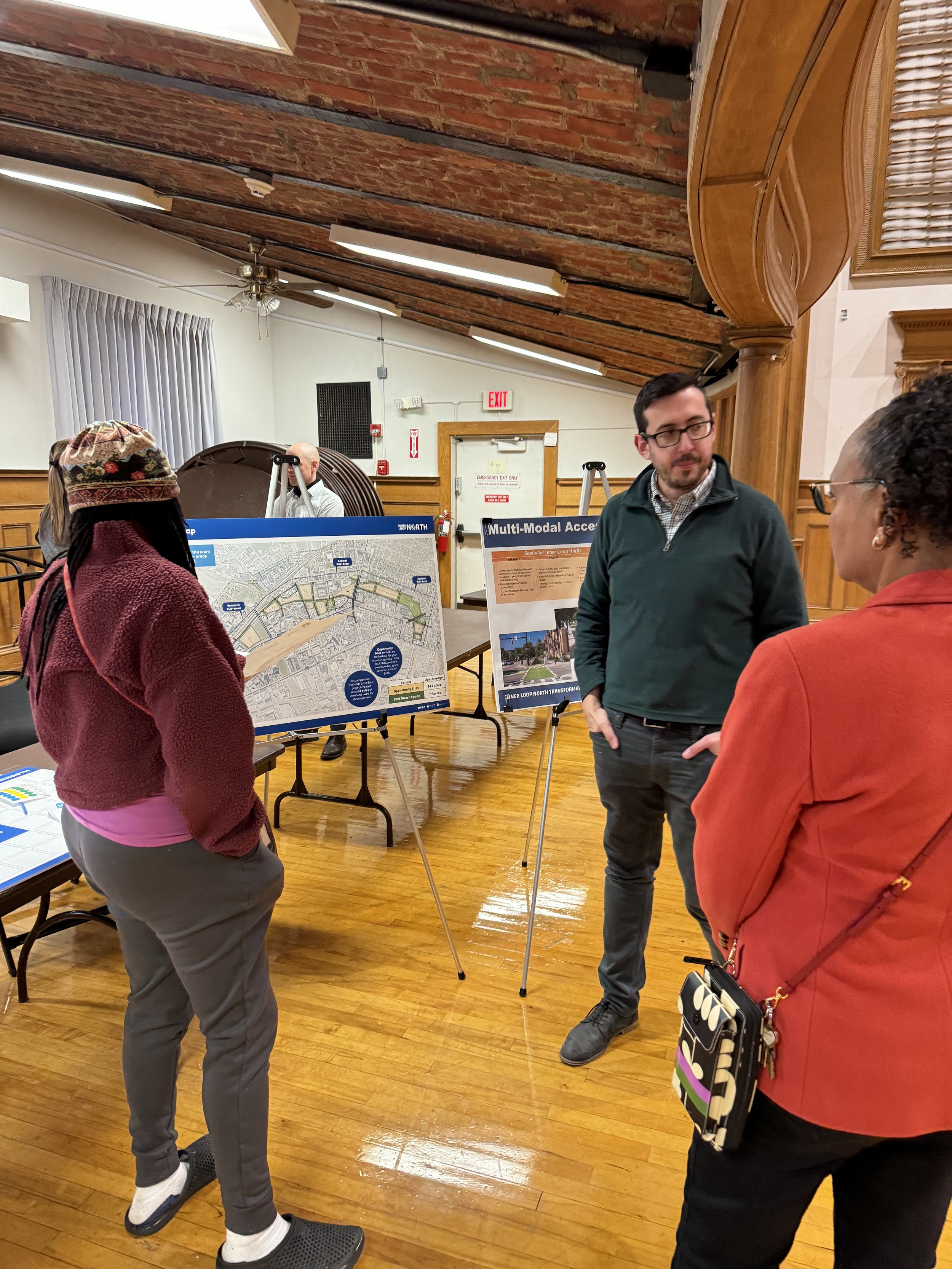
Genesee Land Trust Opens Accessible Observation Deck at Salmon Creek Nature Preserve in Hilton
Just in time for fall birding, local conservation organization improves access to nature for everyone, especially the region’s 300,000+ people living with disabilities
HILTON, NY, OCOTBER 28, 2024 — Genesee Land Trust, the local conservation organization protecting and caring for land and water forever, opened a new observation deck at Salmon Creek Nature Preserve with a ribbon cutting ceremony on Monday, October 28th. The observation deck is the latest – and largest – step in Genesee Land Trust’s ongoing commitment to create more welcoming and inclusive outdoor spaces.
“The observation deck at Salmon Creek Nature Preserve in Hilton is an exciting improvement that benefits everyone,” says Lorna Wright, Executive Director of Genesee Land Trust. “We couldn’t do it without the support and generosity of our members and community partners. Together we’ll keep protecting the places people love and continue working to create opportunities for folks of all ages and abilities to enjoy nature for generations to come.”
The elevated deck features an accessible ramp, benches, and shade. It’s located 1/3 mile from the parking lot along a wide grassy trail that is still bumpy in places. Genesee Land Trust plans to smooth the trail and make other accessibility improvements to Salmon Creek Nature Preserve and other properties.
Starting in 2023, the Land Trust has partnered with Rochester Accessible Adventures to improve access at nature preserves, community events, and throughout the organization.
“Improving accessibility is an ongoing journey that requires truly operating through a lens of inclusion all of the time, and Genesee Land Trust is making real progress,” says Anita O’Brien, Founder and Executive Director of RAA.
Over the past two years, Genesee Land Trust has improved access to its 19 nature preserves in a variety of ways. In addition to the accessible observation deck, the Land Trust has:
· created and/or expanded six parking lots
· built six benches for scenic resting
· built one shade structure over a bench
· updated one boardwalk
Community support for these improvements has been inspiring. Rochester Birding Association provided funding to help create the accessible observation deck and volunteers from Rochester Davis-Fetch and the Carpenters Union Local 276 built the deck as part of their workforce development training.
Representatives from those organizations attended the ribbon cutting ceremony alongside Town of Parma Supervisor Jim Roose, State Assemblyman Josh Jensen, and staff from the offices of US Senator Joe Morelli and NY State Senator Rob Ortt.
“Every time the outdoor places I love to visit improve their trails, it’s like another wonderful world that opens to me… Even little things like a ramp make a really big difference,” says Carol Cobia, a resident of Hilton, NY, that uses an electric scooter. “While I never let my disability stop me, it’s really wonderful that the Land Trust is working to make more local places available to folks like me.”
Carol is one of more than 300,000 people living with a disability in Greater Rochester, but this number doesn’t reflect the full impact of people who need better and more welcoming access to nature.
“We know that when we create more welcoming nature experiences it opens the doors for families and friends to share the joy of being outdoors,” says Kevin Farrell, Director of Conservation Programs for Genesee Land Trust.
Links:
Salmon Creek Nature Preserve details and trail map
Channel 8 News: https://www.rochesterfirst.com/news/accessible-raised-deck-opened-at-salmon-creek-nature-preserve/
About Genesee Land Trust:
Genesee Land Trust supports our community – people, plants, and wildlife - by permanently protecting lands and waterways in Monroe, Wayne, Ontario, Genesee, Orleans, Livingston, Cayuga, and Seneca counties. Founded in 1989, Genesee Land Trust has permanently protected more than 9,500 acres of land, including 19 public nature preserves, 38 family farms, and more than 30 privately owned woods, wetlands, and meadows. A growing group of about 1,000 members support the non-profit organization, which also connects people to nature through complimentary events and educational programming. In 2019 the Land Trust founded the Genesee River Alliance, a leading advocacy group working with city and state leaders on river-related projects like the new state park at High Falls. Learn more at https://www.geneseelandtrust.org/
Haudenosaunee Ceremonial Planting of the White Pine Tree of Peace at Deer Creek Woods East
The September opening of Deer Creek Woods East (600 Lake Road, Ontario, NY 14519) included the ceremonial planting of a White Pine Tree of Peace. We’re grateful to Trish Corcoran (below) and flutist Dr. Jefferson Svengsouk for sharing this special Haudenosaunee ceremony with the 160+ event attendees.
Trish Corcoran is Tonawanda Onondowaga, Bear Clan. She teaches Indigenous and Environmental studies at the Harley School to all grade levels. The Pollinator Garden and Wild Wood are under her care and have gained over one hundred trees planted by students.
She is chair of planning Rochester’s Indigenous Peoples’ Day each year and running educational events throughout the year. Trish also serves on the indigenous Advisory Council for the Climate Solutions Accelerator, the Seventh Generation Land Defenders, and the Indigenous Peoples’ Health Coalition.
She is a collaborator on “Remnants”, an immersive walking art installation that uncovers the history of the land. Most of all she is the proud mom of Bjarne and Eva, who love to hike and camp amongst all their relations.

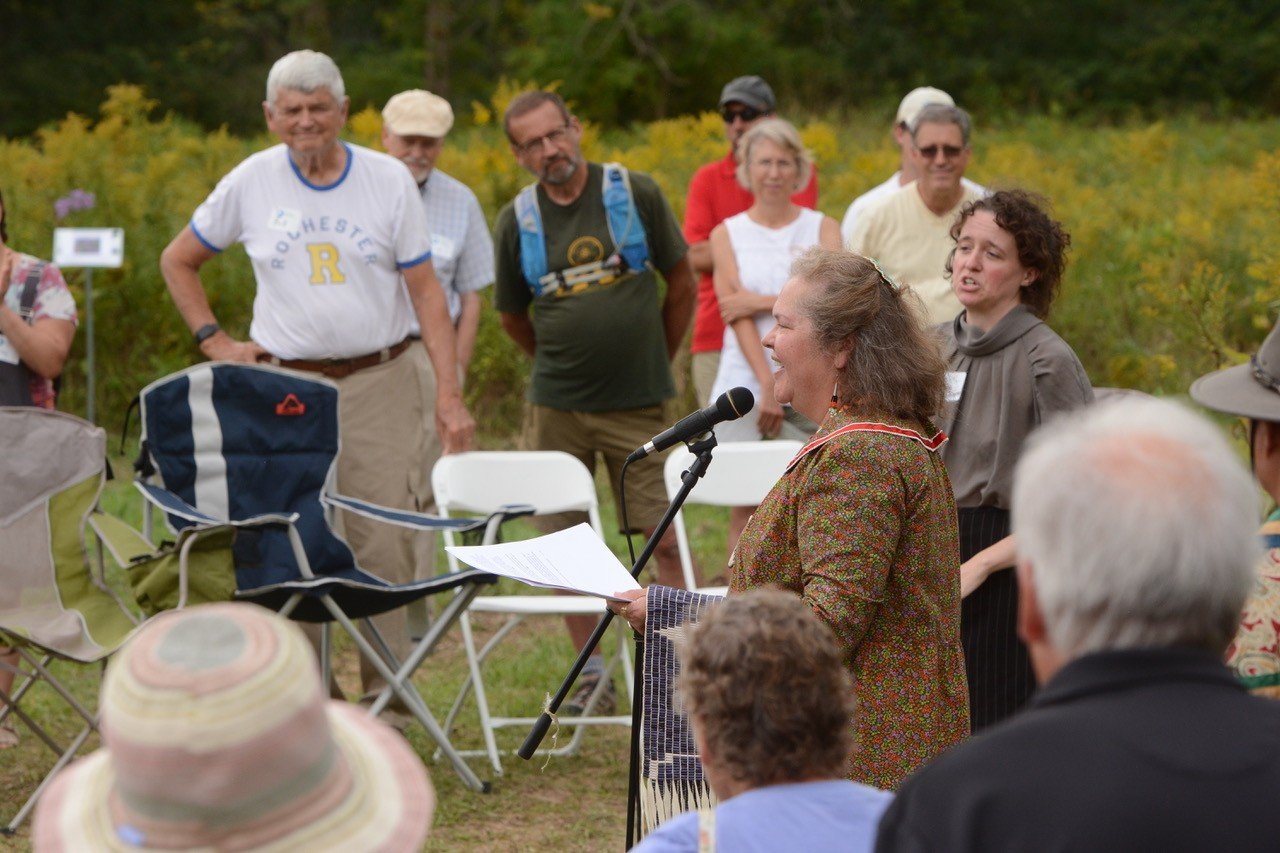

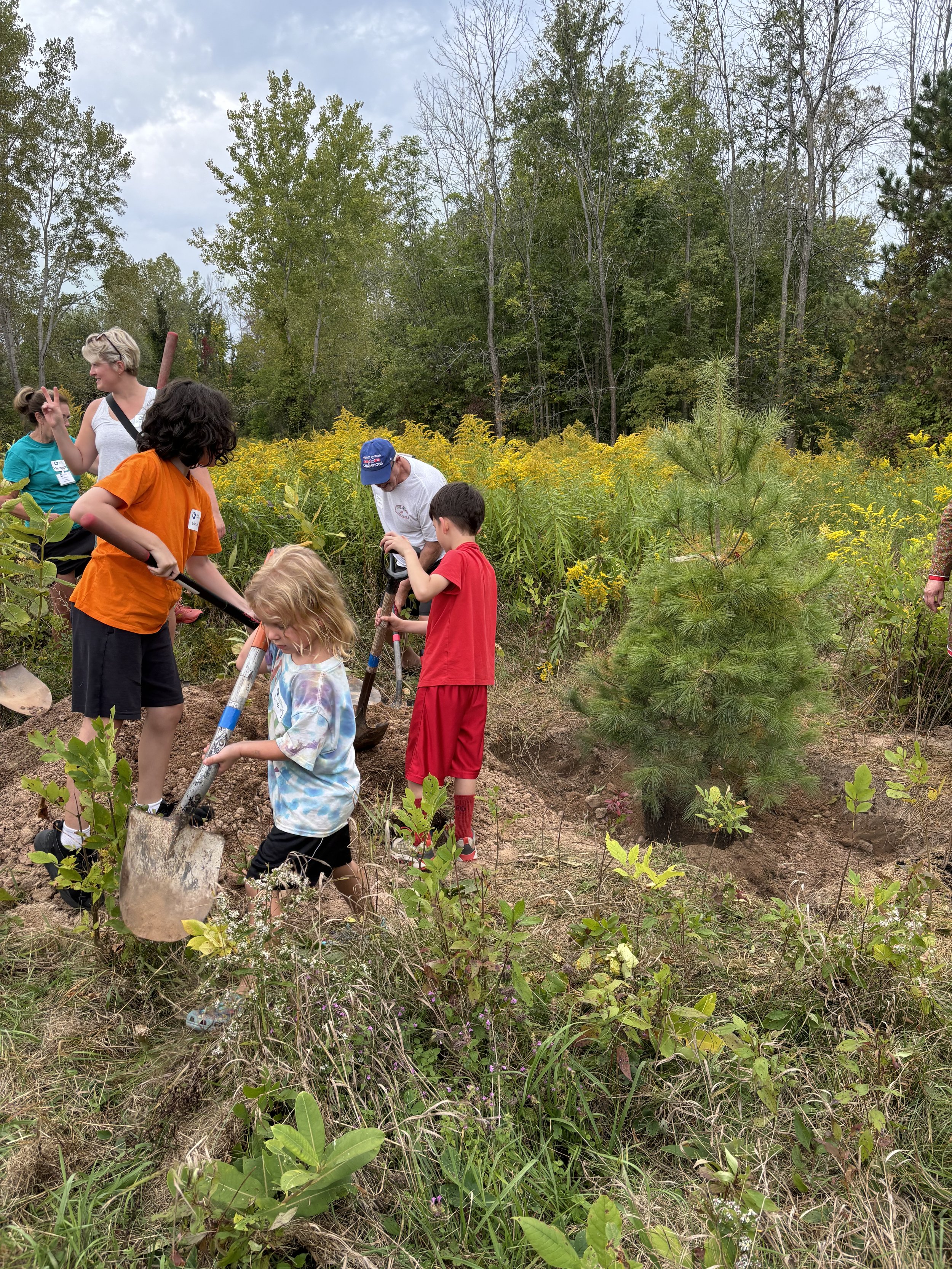




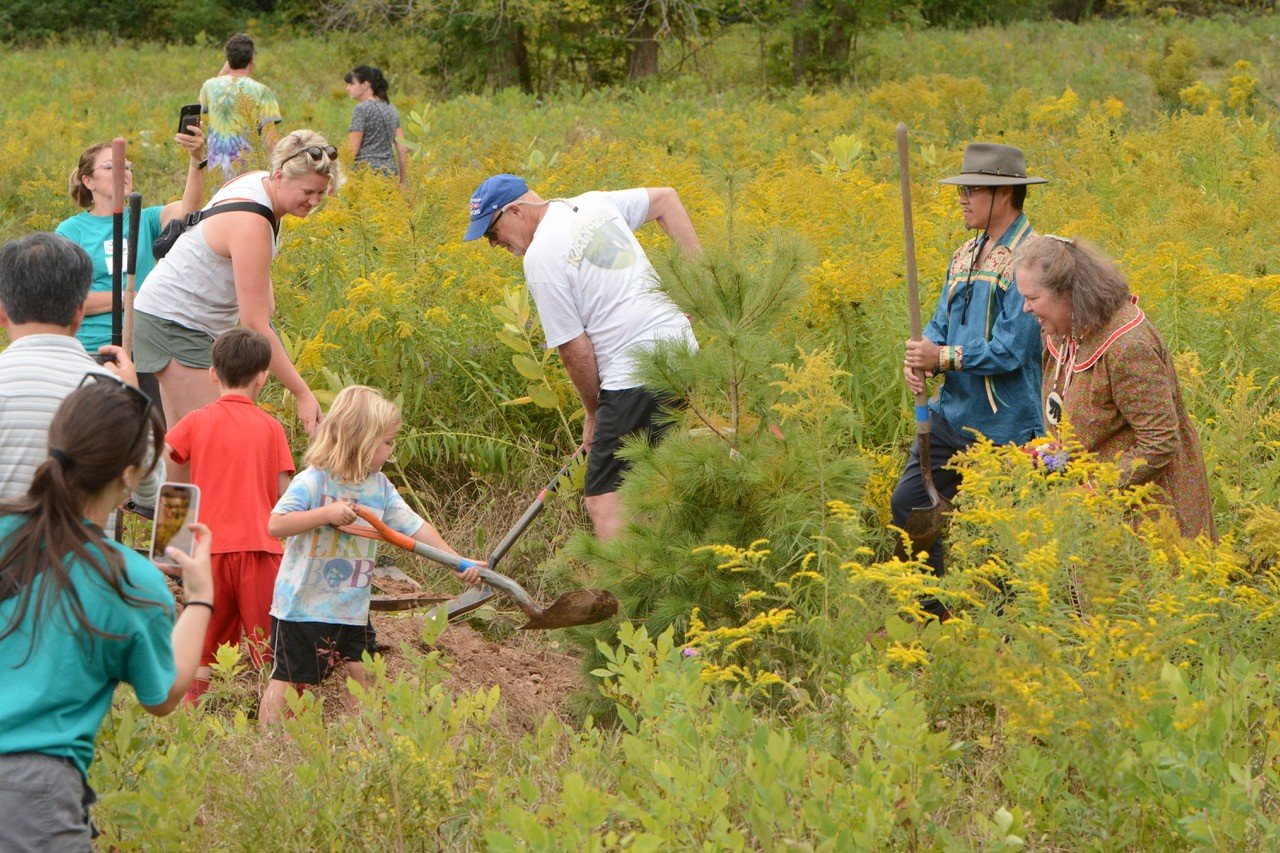


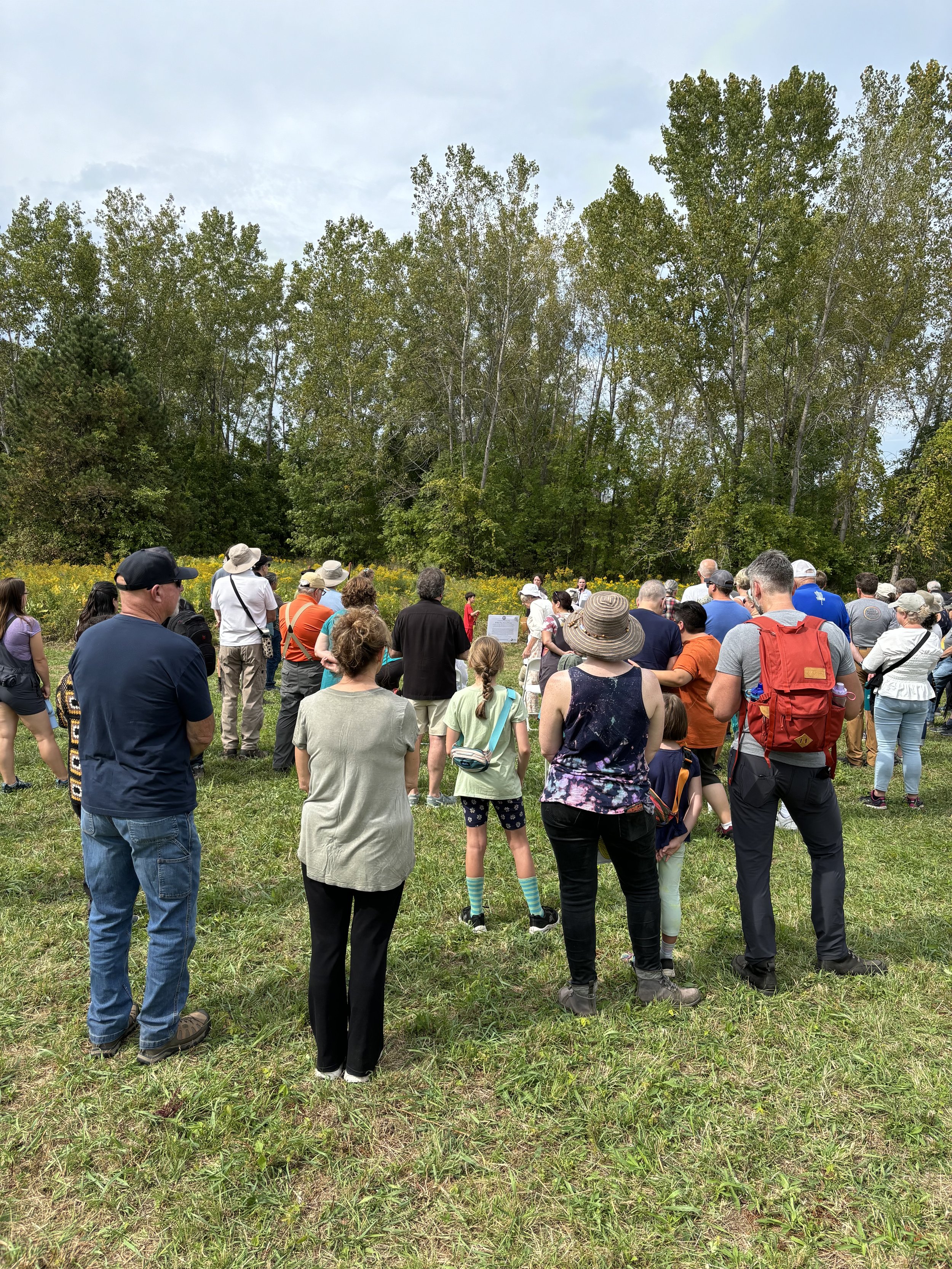
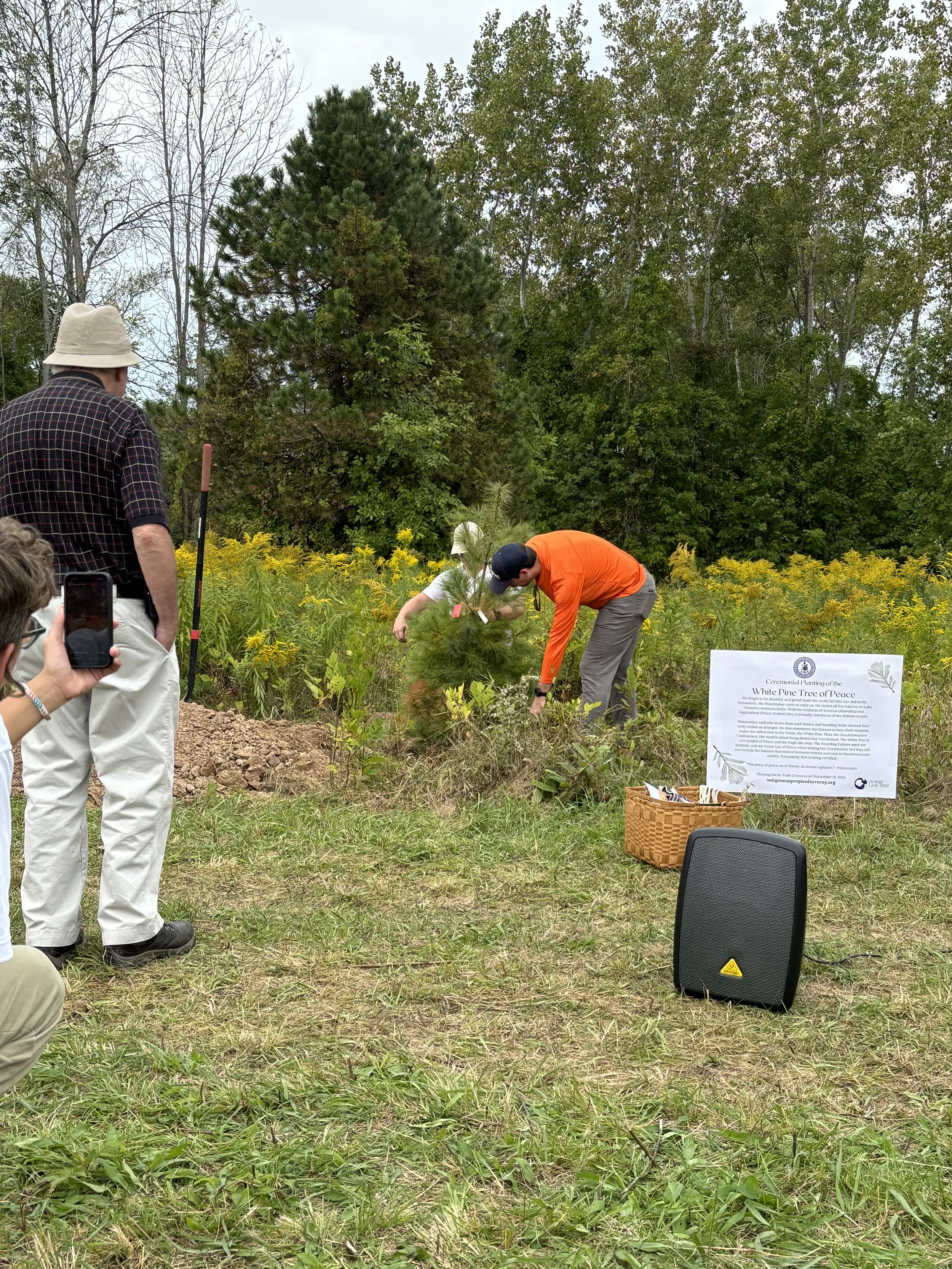
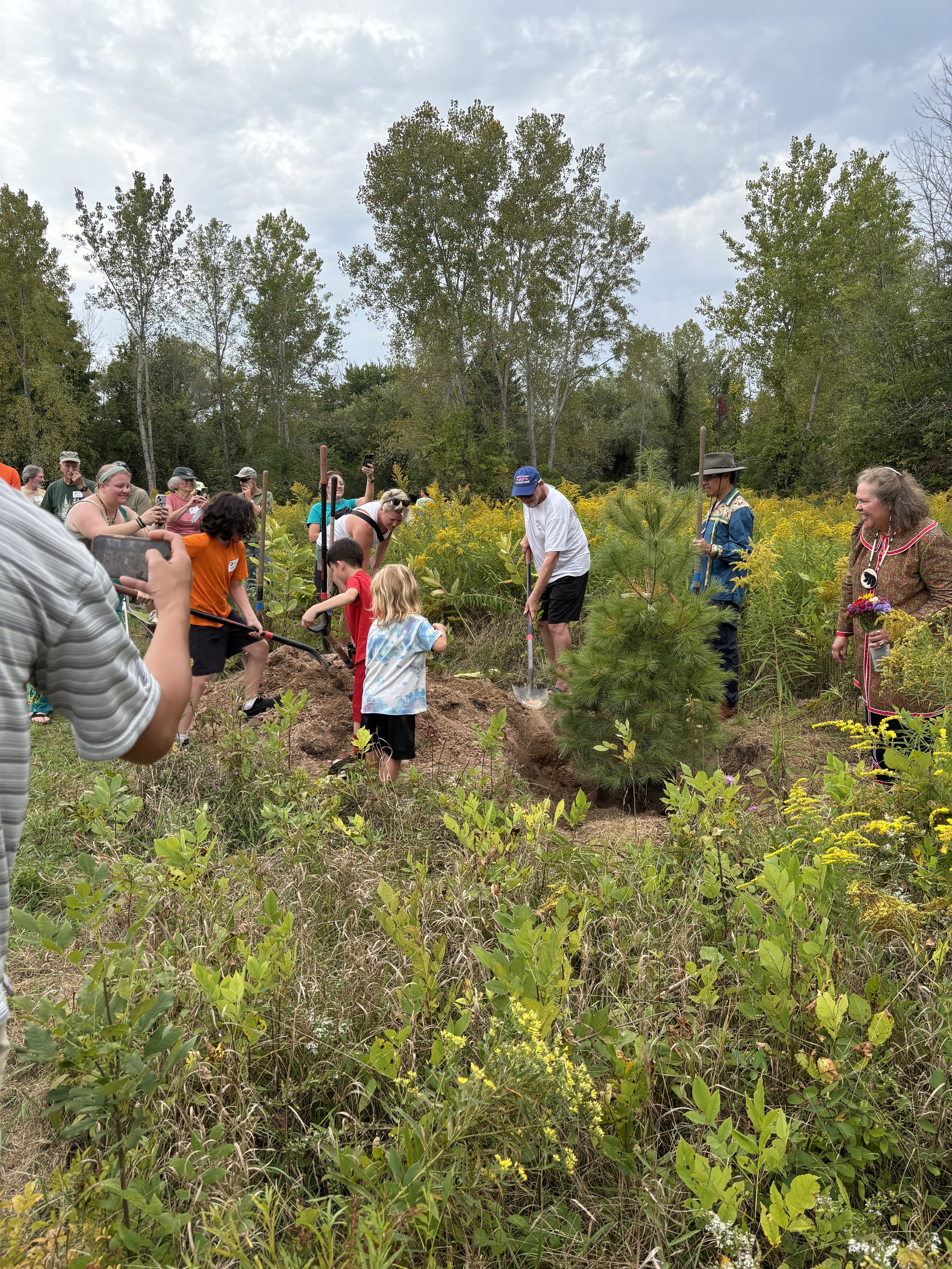
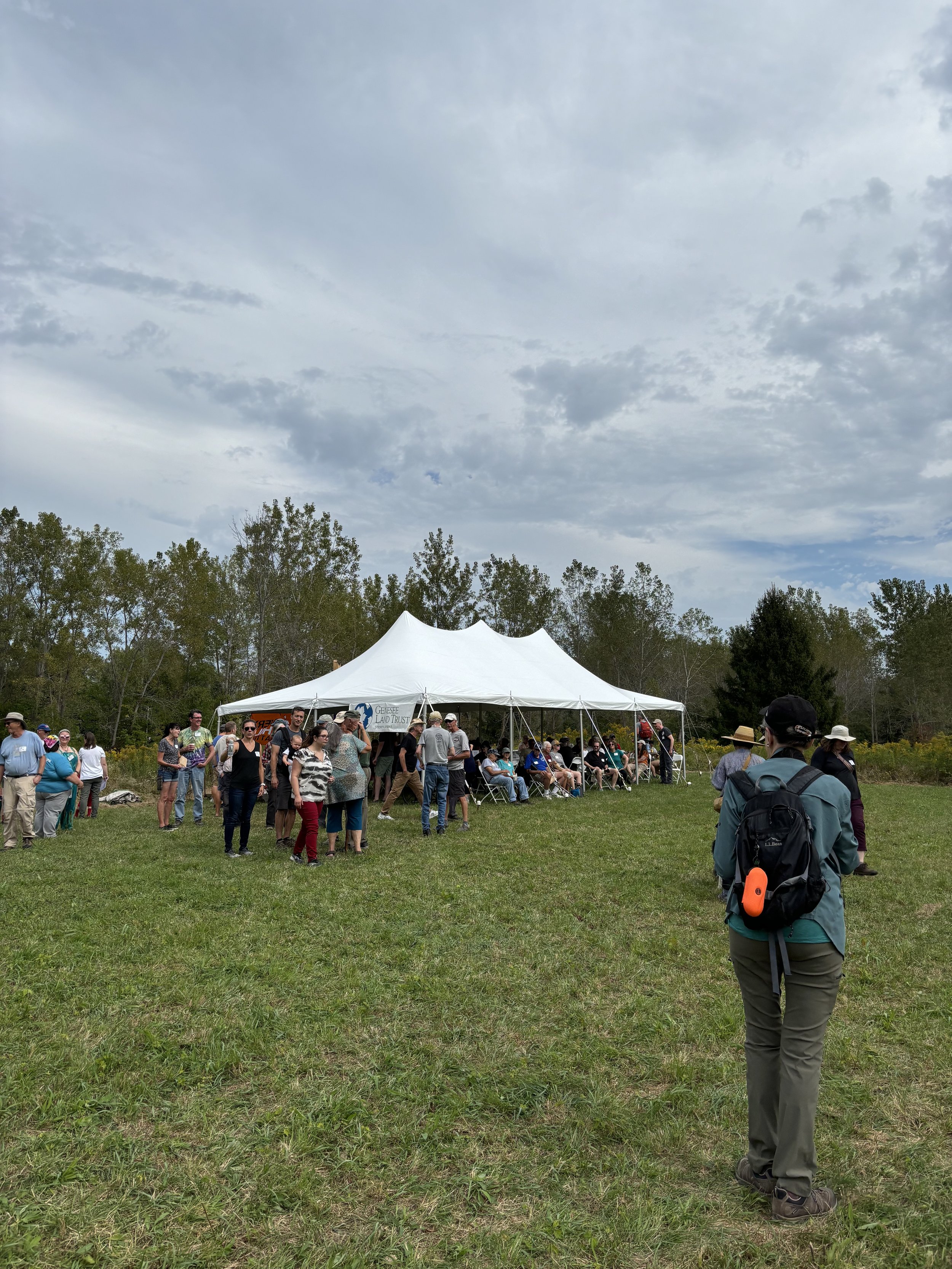


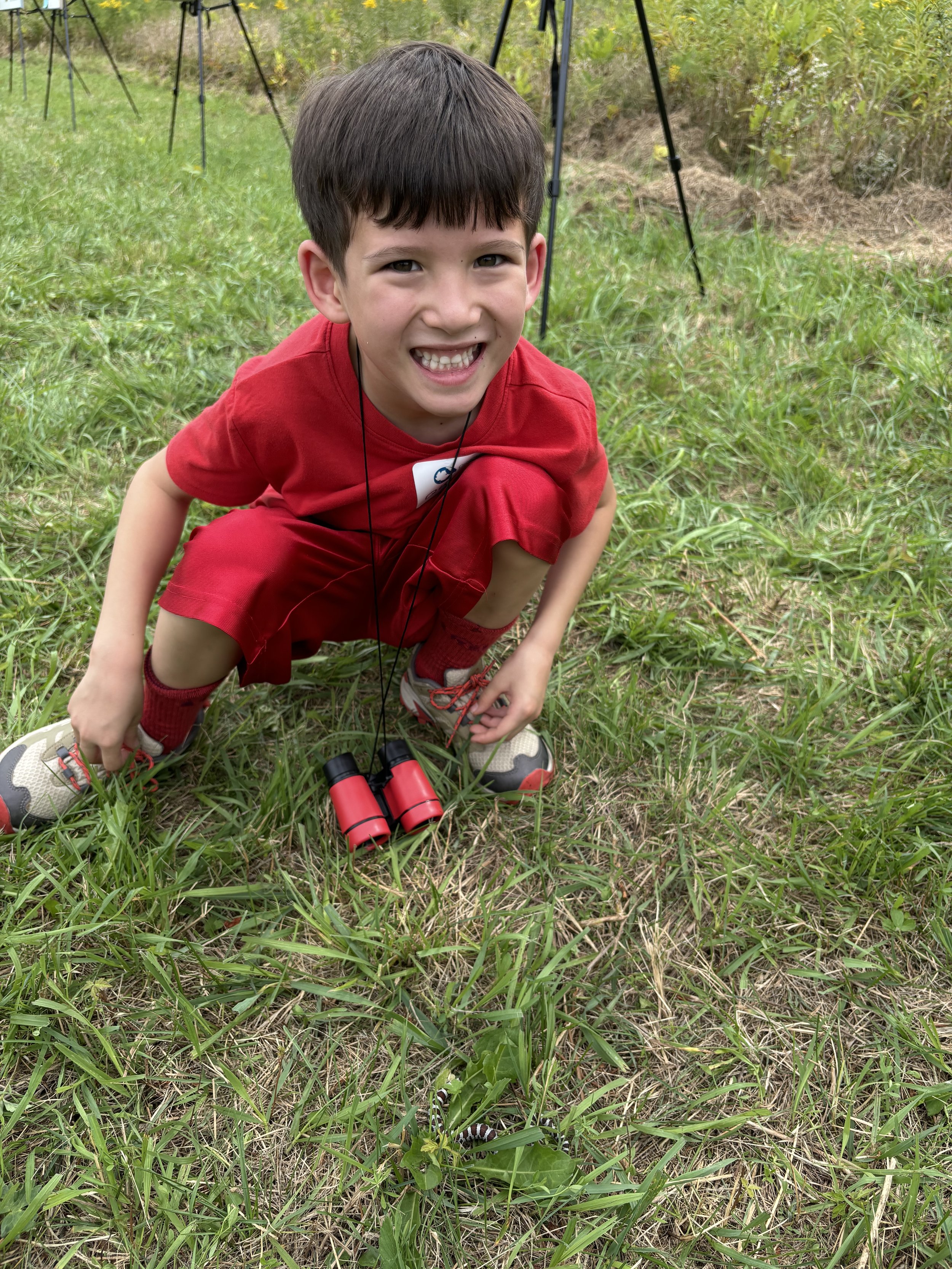
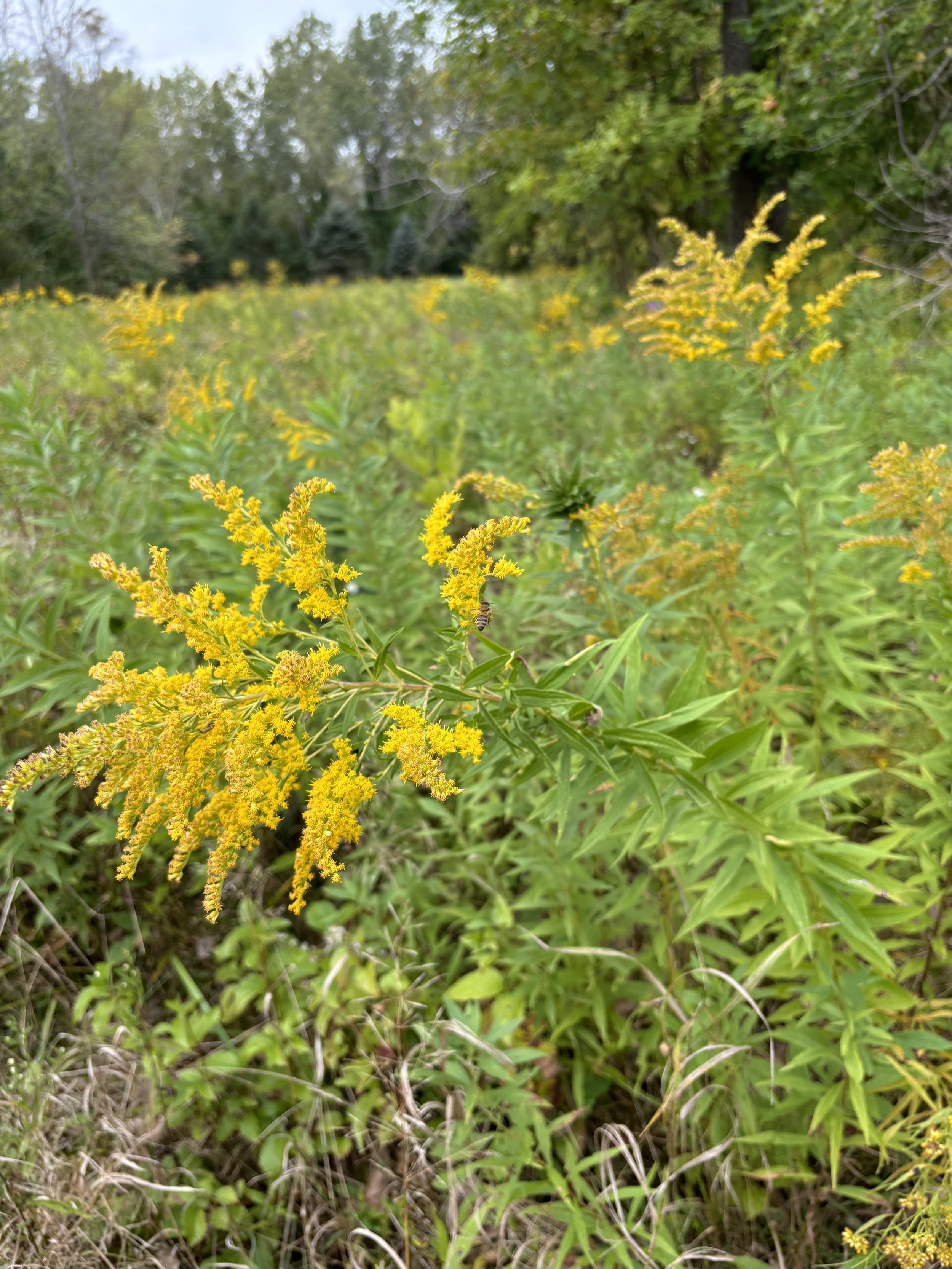


Conservation Helps Farms Transition to Next Generation
Marilyn De Meyer
As dark storm clouds roll closer, Marilyn De Meyer talks about the future of her family farm while checking a drying field of red kidney beans.
She and her son are business partners. Rich (30) has brought more research and seed trials, crop management, and marketing to their business. Started in 1921 as a fruit and vegetable farm, the De Meyers switched to grains and other crops like kidney beans to spread out risk.
“One of the most difficult hurdles for farmers is competing for land against developers,” the 63-year-old farmer shares as it starts raining. “The farmland protection grant is allowing us to purchase a neighbor’s farm, and the additional acreage will help Rich make this his full-time career.”
In May of 2024, Genesee Land Trust permanently protected 595 acres of world-class soil and helped two successful farm transitions — De Meyer Family Farms in the Town of Parma and Goodell Farms in the Town of Shortsville.
These conservation wins — which take 3 to 5 years and 3,500 staff hours each — couldn’t happen without sustaining support from Land Trust members like you.
Marilyn De Meyer and her son, Rob
Farms Facing Hard Times
Marilyn says encroaching development, more extreme weather, skyrocketing costs, widespread labor shortages, and wildly fluctuating markets have made farming tougher than ever.
New York State lost 2,800 farm businesses and 364,000 acres of farmland between 2017 and 2022, according to the recent US Agricultural Census.
“Protecting farmland and helping our hardworking local farmers isn’t just a personal or regional issue,” Marilyn says. “If we can’t produce enough food to feed ourselves, that becomes a major threat to our national security.”
“There are so many older farmers struggling to find a person to take over, it’s adding up to a serious problem. Without a transition plan, unprotected farmland is often sold for development and stops producing food.” –Marilyn De Meyer
Conservation Can Help
Without a transition plan or conservation easement in place, when a farmer retires or passes away the land is often lost forever to development.
That worry inspired Bill and Brycie Goodell to list their farm on the NY Farmland Finder website, a state-wide program Genesee Land Trust participates in as a Regional Navigator to connect current farmland owners with prospective buyers.
Bill and Brycie Goodell
After 18 months of searching, Bill met Mike Verstraete and knew it was the right fit. Over the past few years the younger farmer and his wife Julia have taken over farm operations and Bill has retired.
The Land Trust’s agricultural conservation easement played a critical role in the transition by making the Goodell’s valuable farmland more affordable for the Verstraetes.
“I wish I could have continued on with a next generation, but the farm will continue,” Bill says. “I’m sure there will be changes now, but I do believe we made the right choice.”
If you or a farmer you know is interested in learning more about transition planning, please join us for our Farmer Information Session. Registration is appreciated for planning but not required.
5 Fast Facts About Conservation Easements
Landowners that choose to protect their farmland or wildlife habitat see the land they love as part of their legacy and share a commitment to the future of their community.
Conservation is always a big decision. Here are some important points to consider.
Ownership Retained
You retain your private property rights and can sell, lease, or pass your land on to your family.
Tax Benefits
If you donate at least part of your conservation easement, there can be both federal and state tax benefits.
Tailored to You All
conservation easements are unique to the land it protects and to your vision.
Voluntary
Conservation easements are voluntary and do not require public access.
Estate Planning Benefits
Conserving your land can help with your estate planning, reduce your estate taxes, and can help with a transition to the next generation.




Interested in learning more?
For farmland, please contact Amanda Grisa at agrisa@geneseelandtrust.org.
For wildlife habitats, please contact Cassidy May at cmay@geneseelandtrust.org.
Conservation Success: Fishers Returning to Protected Woods
During the late 18th and early 19th centuries rampant logging and development, combined with unregulated fur hunting, nearly drove the fisher to extinction.
The fisher — sometimes called a “fisher cat” — doesn’t typically eat fish and is not a cat at all. It’s actually a large member of the weasel family with a big appetite, short legs, and thick dark fur.
Found only in Canada and the northern United States, fishers live in large sections of old-growth woods.
Brought Back from the Brink
Thanks to woodland conservation, trapping regulations, reintroduction programs, and extensive habitat restoration the fisher is no longer endangered.
But around here the rebound has been slow because it’s hard for the fisher to find a good home.
Many local woodlands have been cleared, and most of the remaining lands are not big enough or densely wooded enough, or the trees are too young and small for a fisher to build its den inside.
But your support is turning things around for the local fisher population. Thanks to passionate people like you protecting high-quality woodlands like Brookdale Preserve (Town of Chili), we’re seeing more and more fishers and their tracks.


Managing Woodland Critters
Fishers are skilled tree climbers, excellent swimmers, and stealthy hunters.
Because they eat a wide range of prey, from squirrels and porcupines to songbirds and rabbits, fishers manage the populations of smaller woodland animals that could overeat native plants.
Genesee Land Trust staff look for signs of the fisher because they indicate the woods are healthy.
“I’m always glad to see fisher tracks or spot one on my nature cam because they’re so unique and for decades they didn’t even exist in this area,” Jim Miller says. “This one fisher keeps showing up and it feels almost like our neighbor,” he adds with a chuckle. “It’s fun to watch, and a great sign for the future.”
Martha and Jim Miller have loved and cared for Miller Woods (left) in North Rose for more than 40 years. The passionate land protectors donated a conservation easement to make sure their 62 acres of mature woodlands and creekside wetlands will always be safe. Miller Woods is teeming with wildlife, including the fisher.
Do You Have a Special Place?
There are many conservation options available to keep your land private or open it to the public. If you have a woods, meadow, wetland, creek, or other wildlife-friendly place you want to protect forever, we’d love to learn more.
Please contact Cassidy May, our new Land Protection Specialist, at cmay@geneseelandtrust.org or (585) 580-3121.
Keeping Miller Woods Safe Forever
Jim and Martha Miller once sold a small piece of unprotected woods they owned for more than 40 years and quickly saw what can happen when you give up control.
“A lot more trees were cut down before the land was ready, and that’s his right but not what I would do,” Jim sighs. “We’re so relieved it can never happen in Miller Woods.”
In 2018 the Millers donated a conservation easement to the Land Trust and now work with local scientists to study the land’s plants and wildlife.
Winter Signs of Wildlife
January 25th at 11 am Miller Woods in North Rose Join Jim and Martha Miller for a special walk on their private property to learn where and how to look for signs of wildlife — including the elusive fisher. For more details and to register, please visit https://tinyurl.com/MillerWoods2025
Estate Attorney Takes Stock of What Matters
Kate McCurdy, 37, was an “indoor introvert and scared of nature” until her college’s freshman year backpacking trip.
Kate soon discovered spending time outside helped manage her stress, especially when she went to law school. After returning to Rochester to start her own practice, Kate began attending Land Trust events and volunteering.
“Visiting a nature preserve or protected farm feels so grounding and centering to me. I love how the land connects and unites us all, even though we each might care most about birds or trees or farming,” she shares. A Land Trust member since 2017, Kate especially enjoys kayaking and birding along Lake Ontario.
Recently Kate started making gifts of stock to the Land Trust because it’s “the most efficient and tax-effective way to significantly help the causes I care about.”
“I’ve had stocks that have appreciated a lot over time, so I can make a donation from that growth without having to pay any capital gains,” she adds. “Giving with stocks is money I don’t miss because it was never in my bank account.”
Making a gift of stock can be as simple as calling your financial planner. Delivery instruction can be found here.
“Giving with stocks is money I don’t miss because it was never in my bank account.” –Kate McCurdy
More Ways to Give
Become a Sustaining Monthly Donor
Setting up a monthly gift provides critical financial stability to the Land Trust and ensures we can continue the everyday work of maintaining trails and organizing outdoor activities.
Use Your Employer Match
Check to see if your company offers to match charitable donations and/or make a financial gift if you report time volunteering with the Land Trust.
Give From Your Retirement
If you are 70.5 years or older, making a gift from your traditional IRA account can potentially reduce taxable income while supporting conservation.
New Observation Deck Supports Birding for Everyone
More Accessibility Improvements Coming to Preserves
Just in time for the fall bird migration, an elevated observation deck with an accessible ramp, benches, and shade has opened at Salmon Creek Nature Preserve in Hilton.









It’s an exciting addition for folks like Carol Cobia, a Village of Hilton resident who loves exploring nature and uses a scooter when navigating the outdoors. She and her husband Jim joined a birding session during the 2022 preserve opening and shared her need for greater access to nature that’s closer to home.
“Time in nature has brought me such hope and joy and gratitude. While I never let my disability stop me, it’s really wonderful that the Land Trust is working to make more local places available to folks like me,” Carol shares.
While Carol is one of the 300,000+ people living with a disability in Greater Rochester, this number doesn’t reflect the full impact of people who need better and more welcoming access to nature.
“We know that when we create more welcoming nature experiences it opens the doors for families and friends to share the joy of being outdoors with folks who otherwise might not have been able to be in nature,” explains Kevin Farrell, Director of Conservation Programs for the Land Trust.
Prioritizing Access and Inclusion
Starting in 2023, Land Trust staff have worked with Rochester Accessible Adventures (RAA) to improve access at nature preserves, community events, and throughout the organization.
“Improving accessibility is an ongoing journey that requires truly operating through a lens of inclusion all of the time, and Genesee Land Trust is making real progress,” says Anita O’Brien, Founder and Executive Director of RAA.
“We’re already getting strong community interest in visiting the new deck at Salmon Creek and look forward to co-organizing inclusive events to intentionally invite people with disabilities to these fabulous outdoor spaces.”
The community support has been inspiring. Rochester Birding Association provided funding to help create the accessible observation deck and volunteers from Rochester Davis-Fetch and the Carpenters Union Local 276 built it from rot-resistant native black locust as part of their workforce development program.
“Jim and I have been married for 35 years, and getting outside in nature has been a key factor in helping us through some tough times,” reflects Carol Cobia. The Hilton couple live near Salmon Creek Nature Preserve and recently visited to explore the new accessible deck, wide grassy trails, and shady benches.
Creating Welcoming Outdoor Spaces
Earlier this year, Genesee Land Trust received one of ten national grants from Disabled Hikers and the Land Trust Alliance. This, when combined with local support, will help continue making improvements such as these:
• Instead of single-width footpaths, wherever possible trails will be wide enough for two people.
• Parking lots, which increase safety and accessibility for all visitors, will be built sooner at several new nature preserves.
• Adding shade, seating, and inclusive signage are priorities for new and existing preserves.
• Sign language interpreters can be requested in advance at all Land Trust events.
Upcoming Trail Improvements
Staff are exploring designs for fishing access, more seating, signs, and wheel-friendly, all-weather trail surfaces at Salmon Creek Nature Preserve.
Once funding is obtained, the newly opened Deer Creek Woods East and West (Town of Ontario) will include boardwalks, seating, signs, and smoother trails to make the land easier to enjoy.
And at Island Cottage Woods (Town of Greece), which closed in 2023 because of hazardous trail conditions resulting from dying ash trees, trails will be redesigned with elevated boardwalks for accessibility and in response to the changing climate.
To learn more about the Land Trust’s ongoing efforts and how you can help, visit geneseelandtrust.org/accessibility
Shade structure and bench located at Salmon Creek Nature Preserve
Progress Report
Over the past two years, thanks to your compassion and generosity, we’ve made great improvements. In addition to the observation deck, highlights include:
6 Parking lots created or expanded
6 Benches built for scenic resting — 3 at Salmon Creek Nature Preserve and 3 at Cornwall Preserve (Town of Williamson)
4 Ramps installed to replace steps up to bridges and boardwalks at Irene Gossin Nature Preserve (Town of Penfield) and Cornwall Preserve
2 New designs for trail signs created to improve readability
1 Shade structure built over a bench at Salmon Creek Nature Preserve
1 Boardwalk update with toe-kicks to keep wheels from rolling off at Cornwall Preserve
Fishing for Peace, Pleasure, and Preservation
Matt Belanger talks fondly about catching Brook Trout in the trickling stream that ran through his childhood neighborhood. But when Matt recently visited, things had changed.
“I drove down to take a look at the creek, and it wasn’t there anymore! Instead, there was a new neighborhood,” the avid fly fisherman recalls.
“I wish I was surprised, but you see it happening all over the place,” Matt adds. “With development destroying wetlands and climate change warming the water, I’m seeing a lot less fish these days.”
Casting a Line for Conservation
Matt, 63, has happily taught his daughters, neighbors, friends, and many strangers how to fish. Matt and his wife Carol McKenna have generously supported Genesee Land Trust since 2013. Their gifts have helped purchase places people can fish, including Salmon Creek Nature Preserve in Hilton.
Future Vision: Accessible Fishing
The Land Trust hopes to build an accessible fishing platform at Salmon Creek as funds become available in the future.
“Genesee Land Trust’s deep commitment to creating peaceful, inclusive places is such a gift to our entire community, especially the 300,000+ people living with disabilities in Greater Rochester,” says Anita O’Brien, Founder and Executive Director of Rochester Accessible Adventures (RAA).
“It’s a fast-paced and often inaccessible world for too many children and adults,” she adds. “Accessible trails and fishing spots make it possible for everyone to enjoy the health and wellness benefits that time in nature provides.”
Genesee Land Trust has partnered with RAA to become more inclusive as an organization and build more accessible nature trails, preserve features, and community programs.
Matt hopes to fish at Salmon Creek this fall when the salmon swim upstream to spawn and trout follow to eat their eggs. “Fishing is a quiet, zen-like pursuit in beautiful places,” he says. “It’s a great way to fall in love with nature.”
First Bridging Communities Celebration Attracts 600+ People to Riverside Park in July 2024
Overview of party, created by Hill and Valley Creative LLC.
If you are interested in participating in or receiving updates on Bridging Communities 2025, please fill out this form.
Special thanks to all of our partners who helped to plan, organize, and execute the event: City of Rochester, Greentopia, Lower Fall Foundation, Rochester Ecology Partners, The Next Generation and You, Agape Haven of Abundance, Luis Burgos, 14621 Community Rising Inc., and Cat Bauer.
Thank you to all the organizations and businesses that attended: Northwest Neighborhood Service Center, CASH, Rochester Accessible Adventures, Helio Health, Agape Haven of Abundance, City of Rochester Animal Services, Brown Girl Garden, WXXI, Charles Settlement House & Community Place of Greater Rochester, Seneca Park Zoo Society, Tour Blend, Foodlink, Climate Solutions Accelerator AMPED, SewGreen, Rochester Ecology Partners, Photosynthetic Farms, Rochester Refugee Resettlement Services, City of Rochester, Monroe County Department of Environmental Sciences, Motivated 4 Change LLC, Lower Falls Foundation, Genesee Valley Audubon Society, Department of Energy National Science Bowl, Dianatou Boutik, The Mocha Center at Trillium Health, Maplewood Neighborhood Association, Rochester Latino Rotary Club, Common Ground Health, Exploration Elementary Charter School for Science and Technology, J Mills Elite Treats, YMCA of Greater Rochester, 14621 Community Rising Inc., Your Inner Dreams Life Coaching, and ROC Indigenous Peoples’ Day.
Farming in a Changing Climate
“Farming has never been an easy job, and these days it’s getting harder for me and other farmers,” says Erin Bullock, founder of Wild Hill Farm in Bloomfield. “Due to all the weather changes, every year I feel like a first-time farmer again.” “
Just before Memorial Day, Erin sent an email to her 350 Consumer Supported Agriculture (CSA) members asking for help to overcome the challenges she’s already faced this season.
“We’re behind on planting due to the cold wet spring, and the weeds that have grown quickly in these conditions,” she wrote.
“Then the heat came, and yesterday’s rainstorms missed us completely so we’re running around getting irrigation on everything instead of planting…”
Adapting to Extremes
Erin is one of the thousands of farmers across our region working to keep their soil healthy and make food production sustainable in the face of a changing climate.
Higher temperatures and long droughts require expensive irrigation systems. Warmer winters aren’t killing invasive pests the way they used to. And extreme weather events can dramatically reduce crop yields, like last May’s late hard frost which damaged entire orchards of apples and grapes.
In recent years Erin has shifted her planting schedules, switched to hardier crop varieties, and now only grows tomatoes in high tunnels — also known as hoop houses.
Good Soil is Good Business
“Adapting my practices to keep this farmland healthy as the climate changes isn’t just good for the planet — it’s good for business,” Erin says. “Great soil produces great crops, and my customers want delicious, nutrient-rich, organic fruits and vegetables.”
Wild Hill Farm operates on “forever farmland” protected by Genesee Land Trust in 2016 with landowner Hank Stebbins.
Farmers on the Front Lines
“Farmers are on the front lines of climate change, and we know finding ways to keep agriculture viable isn’t easy,” says Amanda Grisa, our Farmland Protection Manager and a farmer herself.
Some of the farmers that have conserved their land with us have used some of the proceeds to invest in more sustainable practices. From organic vegetables to traditional crops like wheat, sustainable solutions are being implemented by more and more farmers every year.
Cover Crops Store Carbon
Bill Steimer, a long-time Land Trust volunteer and farmer in Chili, has focused on the health and protection of local farmland for decades.
To improve soil quality and reduce erosion, many years ago Bill started planting his fields in contour stripes and using cover crops (pictured above).
Cover crop roots prevent soil run-off during heavy rain, improve water retention, and restore important nutrients to the soil. They also help slow climate change by absorbing excess carbon dioxide from the air.
In 2023 Bill and his wife Audrey preserved their 132-acre farm on Reed Road.
“Local farms are vital to the future of our region and nation,” Bill says. “Land isn’t just a farmer’s life, it’s everyone’s.”
“Adapting my practices to keep this farmland healthy as the climate changes isn’t just good for the planet-it’s good for business.” - Erin Bullock
Doctor Says New Yorkers Need More Time Outside
Mervyn, pictured with his four granddaughters, has long realized that being outside in nature is critical for our health.
Courtesy of Mervyn Weerasinghe
Dr. Mervyn Weerasinghe, 81, says spending time in nature helps him stay active as he ages.
“Being exposed to nature definitely reduces stress and increases a sense of wellbeing,” the Pittsford resident and avid gardener explains. “Because we have chosen to live this far north of the equator, if we don’t spend enough time outside in the sun we don’t get enough vitamin D.”
Mounting evidence suggests low vitamin D levels increase the risk of respiratory illnesses, osteoporosis, dementia, diabetes, and some cancers.
Mervyn grew up and studied medicine in Sri Lanka before moving to the United States. He and his wife Jane have been long-time members, and Mervyn volunteered for many years as a Preserve Steward of Christine Sevilla Wetlands in Caledonia.
I felt a sense of responsibility to make sure it was safe,” Mervyn says. “Preserving precious lands — whether it’s a wetland, something by a stream, some farm — I’m glad to support something so important to our region and our future.”
Deer Creek Woods Opening!
For 30 years a group of passionate neighbors has worked with Genesee Land Trust to permanently protect old growth woods, grassy meadows, and creekside wetlands in the Town of Ontario.
The result is a high-impact conservation win — 294 acres near Lake Ontario will continue filtering our air and water, storing excess carbon, and supporting wildlife and people for generations.
Thanks to your ongoing support, Deer Creek Woods opens this fall as the 19th public nature preserve created and cared for by Genesee Land Trust.
Introducing West and East
Deer Creek Woods has two public areas buffering three private conservation properties (see map). Deer Creek Woods East — purchased from Bob Smith in early 2024 — has a loop trail along the creek and will be the focus at opening. Volunteers recently planted 200 tree saplings and a parking lot will be added this summer.
“I’m so glad this land my late wife Janet and I have loved for so long is in good hands,” Bob says. “Genesee Land Trust has been a good friend to our family. I feel good knowing Deer Creek Woods will be preserved as a natural treasure for our community to enjoy forever.”
Deer Creek Woods West, purchased from John Creatura in 2022, isn’t as easy to explore yet due to the terrain. The diversity of habitats makes it more resilient for birds and other wildlife as the climate changes.
The First Step Towards Forever
Genesee Land Trust began working in Ontario in 1994 when Janet Buchanan-Smith, Bob’s wife, donated her first voluntary conservation agreement (conservation easement) while retaining ownership of the land. That kicked off a series of protection projects (see map).
Our deepest thanks to Janet, Bob, John, Amanda Smith-Hatch and Keith Hatch, Ann and Floyd Welker, the Town of Ontario, and the Land Trust’s nearly 1,000 members for saving Deer Creek Woods.
What Forever Means at a Nature Preserve
Connecting River Neighbors at New “Bridging Communities” Party
To continue our work engaging riverside residents - particularly those from the Edgerton and El Camino neighborhoods - Genesee River Alliance will host a new summer celebration called “Bridging Communities.”
“We have a mixed history with our river, but the future is bright,” says Luis Burgos, former commissioner of Rochester’s Department of Recreation and Human Services (DRHS). “Connecting neighbors and building community support for the mighty Genesee is a great service to the entire city.”
A Party for All People
Driving Park Avenue Bridge (pictured) will become an entertainment stage featuring local talent during the party.
The bridge and nearby Maplewood Park will host local artisans, community resource tables, free
food, and fun activities for all ages. New York State Parks Department will run a Q&A session about the proposed state park at High Falls.
A photo booth from DigiBooths will promote our #RocYourNature summer campaign. And tours along the riverway trail to Lower Falls will focus on local history, like the connection to the Underground Railroad.
Building Community Support
Our thanks to our partners: the 14621 Rising, Agape, City of Rochester, Foodlink, Greentopia, Lower Falls Foundation, Maplewood Neighborhood Association, Next Generation and You, and NY State Parks.
Bridging Communities is currently sponsored by ESL Federal Credit Union, FIFCO/Genesee Brewing, DigiBooths/DigiGroup Entertainment, Coca Cola, and Canandaigua National Bank.
Driving Park Bridge crosses the Genesee River gorge at Lower Falls and connects the El Camino and Edgerton+Maplewood neighborhoods.
Bridging Communities River Party
Sat., July 27th • Noon -3 :30 pm
Maplewood Park Rose Garden (across from Maplewood YMCA)
For more information visit:
If you would like to become an event volunteer and/or sponsor, please contact Helen Dumas, Director of Urban Engagement, at
hdumas@geneseelandtrust.org or 585.450.3932.












